Creative Resources for ESL/EFL Teachers


ESL Presentation Topics: 12 Mini Presentations
ESL presentation topics for intermediate and upper intermediate students. Great as a warm-up or a speaking lesson.
You can use the slideshow and share your screen on Zoom or other app when teaching online. Just click on the full screen option in the top right corner of the slideshow.
I used it with my students during our online lesson and we didn’t even have time to discuss all the topics, because they couldn’t stop talking. I was quite impressed how much they knew and also how well they could express their opinions.
One of the reasons why I love conversation activities is that I learn so much about my students. I think that we often underestimate our students and see them as the stereotypical lazy teenagers. Activities like these can show us that they are much more than that.
You can also download the PDF for easy printing below.
Other picture-based resources:
ESL Exam Speaking Picture Description and Questions
No-Prep ESL Picture Description Speaking Activity
Picture Based Speaking Activity For ESL/EFL Classes
Picture Prompts for Speaking and Writing: An ESL Activity
ESL Picture Description: Exam Skills Practice
Food and Travel ESL Lesson: Interactive Online Lesson
Conversation resources:
Popular Conversation Topics for (not only) Adults and Teenagers: 50 Questions
Conversation Starters: 30 Interesting Conversation Questions Not Only For ESL Students
Conversation Questions Gerunds and Infinitives: ESL Speaking Activity
30 Hypothetical Conversation Questions for ESL Students
ESL Conversation Topics

Related Posts

Role play: Making Polite Requests
Very helpful role plays on polite requests.

5 Apps To Learn English Without Knowing It
There are 2.2 million apps in Android store and 2 million in Apple’s App store. I’m sure a huge number of those apps is useles, but you can also find there plenty of helpful, entertaining of educative apps. Here’s a simple infographic of 5 apps I’ve been using with my…

Funny Conversation Starters: 60 Questions
Save time preparing your ESL conversation lessons, try these funny conversation starters. Need a warm-up activity? Looking for something different and fun? No problem, share your screen if you teach online or use a projector when teaching in the classroom. You can also download the PDF and print the questions….
Comments (7)
- Pingback: 50 ESL Conversation Questions for Teenagers and Adults | EFL Ideas
- Pingback: ESL icebreakers, warm ups, back to school activities and more | EFL Ideas
- Pingback: Phrasal Verbs Activity Exercises Discussion Questions | EFL Ideas
- Pingback: Conversation Topics for (not only) Adults: 5o Questions - EFL Ideas
- Pingback: Conversation Starters: 30 Interesting Conversation Questions - EFL Ideas
- Pingback: Back to School Activities ESL for ESL Classes- EFL Ideas
Amazing! Thanks a lot
Leave a Reply Cancel reply
Your email address will not be published. Required fields are marked *
Save my name, email, and website in this browser for the next time I comment.
This site uses Akismet to reduce spam. Learn how your comment data is processed .

15 Speaking Projects And Activities For ESL Students
I don’t think I am sticking my neck out too much by saying that most ESL students enjoy speaking activities more than typical reading, writing and listening activities. Tending to be more dynamic, true to life and fun, a good speaking activity can really enhance an ESL student’s fluency and confidence.
Here, I am going to offer you a series of ESL speaking projects that you can adapt and use for your ESL students. Let’s go:
Infomercial Activities
This is one of my favorite speaking projects by far. Show students some typical adverts from a shopping channel; I like to show some of the funnier products just for giggles and to encourage students minds to wander, take a look at this compilation to see what I mean.
Next, I ask students usually in pairs to come up with their own completely original product to sell on an infomercial. If students struggle to come up with a completely new product you can suggest they add a new twist to arnold product, or make a new product based on a combination of two or more others.
For example, in the past I have had: microwave televisions, hair dryers that double as vacuum cleaners and laptops that double as portable stoves.
I tend to also do a language lesson based around the language of selling and persuasion so that when students make their infomercial they will send realistic and they often like to know some of the sales phrases, tactics and strategies that are used in real life.
Just for fun, you can tell students that they have a certain amount of money to spend and after they have seen all the infomercials they get to spend it. Sales can be recorded and you can see which idea/pair has made the most money and are the winner!
Presentations
Give students a presentation of a topic of your choosing, perhaps your own hobby and model the format and language that you want the students to use.
I tend to share slides with the student with the title of each slide already inserted. Students then have to fill the space with suitable information for that slide.
So, for example, if I wanted my students to present their own hobbies then I would probably have six slides titled with questions:
What is my favorite hobby? Why did I start this hobby? What have I achieved doing this hobby? Who do I do this hobby with? What will I do next in this hobby? Other interesting info about my hobby.
Students then fill the slides full of pictures that relate to the question and then they talk about these to the group and answer questions.
Some students always want to write out a script for a presentation which I let them do on the understanding that they can’t actually read it when they present. I allow them to write it out just so they can build up some confidence in what they are going to say and check the language accuracy of it.
I do usually place sentence starters and linking words on posters behind the audience so that the presenter always has some support if needs be.
Of course, this could also be done as a recorded video task. I sometimes ask students to record a voice over on top of the slides. This can then be converted into a video format for sharing later.
A few other simple presentation topic titles for ESL students that could be used are: My Best Friend, Who Am I?, My Pets, My Future Career, My Family, The Last Celebration I want to, Why I am a fan of __________ (insert name of whatever they are a fan of).
At this point you might also want to read one of my popular article about how to make your students speak English , here
Hot Seat ing
Become an expert – As it sounds. Students spent a certain amount of time researching a topic that either they choose or that is given to them. They are then to become that character and the rest of the group has to ask them questions to find out as much as they can about them in a set amount of time.
You can award points for correct questions being asked and for grammatically correct sentences in response. Personally I like to do this at the beginning of a new topic and direct students to research different famous people.
For example, if we are going to be covering the topic of Travel as in the IGCSE ESL then I have students research characters, such as: Dr Livingstone, Joe Simpson, Ernest Shackleton, Amelia Earhart, Ranulf Fiennes, and so on.
I often have students create a mini glossary for their characters as well which other students can refer to as they are quizzing the character.
This activity is best for intermediate level and above students and even then you may need to provide texts at a suitable level for students to be able to access, otherwise students end up on Wikipedia reading very difficult text.
You can have the group make notes and write summaries of each character for homework if you also wish to work on summary writing skills.
Recommended reading: 15 Research Projects For ESL Students
The Detective Game
For this activity you make up a crime that occurred in a given location, the more gruesome the better and if you can personalise it to your location and environment more the better.
Divide the group into smaller groups of three or four people and then ask them to create their alibis for the morning, afternoon, or evening in question. These people are the suspects.
One group, however, is assigned as being the investigators and they individually quiz different suspects one to one to try and find inconsistencies in their group’s stories. This forces each group to consider exactly what they were doing, where and with whom very carefully and in great detail.
After interviewing as many members of each group and making notes about inconsistencies between group members the investigators then confer with each other to decide upon which group’ alibi is the most inconsistent. This group are then sent to jail.
Whilst the investigators are discussing this, the suspects discuss which investigator was the best at questioning them and finding out the inconsistencies. The suspects will then announce who this person is, and they earn a promotion. Finally, the investigators announce the losing group which will go to prison.
This ‘game’ has got real legs and could go in so many different directions, so don’t be afraid to improvise and have fun with this one.
Drama Activities
Acting out a chapter of a book. Pretty much as it sounds. Read through a chapter of a book with students or have them read it for homework before letting groups act out the chapter, or a scene from it.
This works well even if they all act out the same scene as each group will learn from the last and the acting/performance and language should get increasingly better throughout. Alternatively arrange it so that each group acts out the following scene to the last group and so the full story is told.
Storyboard and act out the student’s own story. Rather than act out a book, you could have students plan out a story, or at least part of a story on a storyboard. This can give a greater sense of ownership, achievement and ‘buy in’ from the students.
What happened next. Read the opening of a book and as a ‘cliffhanger is reached’ pause and have students work together to act out the ending of the story or the next scene at least.
This also works well with videos from YouTube, crime videos work well as do Walt Disney cartoons – even with adult learners for some reason!
You might also be interested in reading my helpful article on how to get your students speaking fluently , here.
Mind Map ping
Vocabulary relationships. Engage students in a subject which contains lots of relationships of cause and effect. Basically, you need to pick a topic and analyse what the different factors were that affected the main decision or characters involved.
In the centre of your mind map place the decision or a character that was made and then arrange influencing factors around this.
The larger the circle each factor is in and the closer it is to the centre of the paper the stronger the influence is. Students then need to explain their mind map and the relationships to the group. Others can question and agree/ disagree with them.
Topics can range from serious issues from history through to celebrity scandals, or even plots in a movie, such as, why did celebrity couple X and Y get divorced, or why did actor x decide to y in the movie xyz. Obviously, you can let the students self select these issues for greater interest.
Backs To The Board
A timeless classic not so much a speaking project but this can be developed into a full lesson’s worth of speaking and it works for groups of all sizes. It is excellent for reviewing vocabulary at the end of a project or to see what students know at the beginning of a topic.
Simply split the group into teams of no more than five and have one member of the group come to the front and sit with their back to the board.
The other members of the group form a ‘u’ shape around the person, or, rather than being sat literally against the board groups can be sat at tables with just one student having their back to the board.
All you then need to do is to write a word on the board and the students facing the board have to get the person not facing the board to say the word without literally telling them the word. They should be encouraged to use definitions, synonyms and examples of the word where possible.
Depending on numbers, students can just shout out when they think they have the answer, or with large groups I make the students raise their hand if they think they have the answer.
The danger with debates is that to the teacher they may seem boring, or at least they do to me but have to remind myself that just because I have done the debates dozens of times, they haven’t and even the most overdone/boring sounding debates may go down like fireworks with some groups.
With that in mind here are a few of the more traditional/boring debates for your students to get their teeth into:
Which is better, country life or city life?
Should animal testing be allowed?
Should school uniforms be gotten rid of
Are cats better than dogs?
Should women be paid as much as men?
Online learning is better than classroom learning
Does money equal success in life?
I also like to see if there is something going on in the students view of the world that is worth debating. For example, in Thailand the debate over whether Korean pop music is better than Thai pop music is a popular one.
I have had colleagues dive into debates about serious political topics with higher level students which have worked really well.
However, some topics are just too hot to handle and you don’t know who you are upsetting so be careful what topics you do debate, you never know who is listening, or who is going to offense at any of your personal views that you may let slip!
Here is a good resource for more ESL debate ideas .
Book And Movie Review s
This is pretty much as it sounds. I like to set a reading task for students over a holiday break and when they return they have to submit a video review of the book or movie they watched/read.
I usually show them a good movie review for ideas and ask them to follow the same format. Something like this review of Kung Fu Panda . This goes along the lines of: background information, main characters, plot explanation, favorite moments, final recommendation.
I’ve also done this with higher level groups for documentaries but with enough support and speaking frames pre intermediate students can engage well with this activity.
Conversation Question s
Don’t underestimate the value of pure lists of conversation questions. Students are often happy to just ‘have a chat’ and use the English that they do know.
It is great for their confidence and fluency, as well as requiring zero lesson prep, which is always a nice thing. Just be sure to rotate speaking partners to avoid students getting bored with the same partners and used to different accents.
Sometimes, depending on ability and interest levels I will teach three or four idioms at the beginning of the lesson and set the task of trying to naturally drop them into conversation later on.
There are lot of good sources of conversation questions, here are a couple: eslconversationquestions.com and esldiscussions.com .
ESL Exam Preparation Material
Some students are hugely motivated by doing well in exams such as the IELTS test, and IGCSE ESL speaking tests. Exam boards for tests such as these produce a plethora of practise material that is often available for free online and ready to be use.
My students particularly enjoy the IELTS speaking part 2 task where they are required to speak about a given topic and are given three bullet points to talk about. They are given one minute to prepare their ideas before they have to speak on their own for two minutes.
If you think your students might enjoy this then here are some good sources of free IELTS style questions: IELTS IDP and ielts-exam.net , and for IGCSE ESL speaking questions check out the role play paper here.
The added bonus of these activities is that there is always a grading criteria ready to be used so you can grade students and give them real reasons why they scored a certain level and what they need to do to score higher in the future.
Here are the IELTS speaking criteria for example which clearly spells out what is expected of students at different levels.
Finger Puppet Shows
One really good way to get shy students speaking I have found to introduce sock puppets. As silly as it sounds, there is something about using a puppet that takes away the pressure on the speaker and frees them up to speak.
Whether it is the element of hilarity of speaking sock or the fact that people are generally looking at the sock rather than the person it seems to work well.
Depending on the ability level I will either give pairs of students scripts to act out with puppets. They can introduce their own props as well to make it even more funny. Alternatively, I will do this as an improv.
I will read out a situation, for example, one of you has lost their passport at the airport. Then the students have to act out this scenes as best as they can.
Switch partners and introduce more situations and watch the energy level of the room pick up!
By the end of the lesson you may well notice previously shy students speaking confidently with other students having been drawn into the magic of sock puppets! A great little speaking project.
Role Plays With Idioms
I use this lesson pattern quite regularly and it works well. I start off with student matching idioms to meanings and then to example sentences with the idioms missing.
After going through these answers and doing any teaching necessary to aid understanding I will then hand out a dialogue but with all the sentences jumbled up.
Students then have to unjumble the conversation which contains one or more of the idioms being used in a natural way. Next, they read the dialogue through taking different roles each and then doing the dialogue again without looking at the words.
Next, students are given the task of creating their own dialogues using at least one of the idioms in an appropriate way. Students write out the dialogues, rehearse them and then act them out for the group.
You can also do this with phrasal verbs but either way it works out well and the routine can be used again when you are a bit short of material or are having a hangover day!
Barrier Activities
One favourite of mine that never fails to stimulate plenty of language use is to simply create your own barrier exercise. I like to get a nice chunky newspaper article related to what we are learning and then go through each paragraph and remove key details, such as: names, dates, place names, times, location etcetera…
I create two versions of this, the first one will have words missing from odd number paragraphs and the second copy will have words missing from even number paragraphs.
This prevents it from becoming confusing and make sure to keep one master version with no details missing and if you have time highlight the missing words in red so it is easy for students to check later.
Once the missing word copies are ready you can divide the class into two halves distributing sheet A to one half and sheet B to the other half. Allow them to work in groups at this point to work out what questions they need to ask the other half of the group in order to get the missing details filled in.
If you think this will be too difficult for them you can provide the questions in a jumbled up format so they have to rearrange them to make the questions,, or even give them the questions but they have to work out the order in which to ask them to correspond to the paragraph order.
After this preparation period students can then pair up with someone from the opposite half of the group to take turns asking and answering each other’s questions.
Make sure that students do not show each other their articles and simply just sit and copy the answers, clearly this simply defeats the whale point of the exercise.
Before starting this I also pre teach any tricky vocabulary that I know is going to come up in the article just to make sure the final questions and answer session goes without too much stopping and starting to ask about vocabulary.
After students have got the answers then you can either display the answers on an overhead projector, or send students back to their original half of the group to see if they have all gotten the same answers.
Jigsaw Reading
This is another easy way to get students involved in the language and speaking. Select a relevant article related to the topic you are studying and chop it up into paragraphs. Hand out A4 paper with a simple one column table with as many boxes as there are paragraphs.
Hand out the paragraphs to the students considering which paragraphs are more difficult and should go to the higher level learners and which are slightly easier and can go to the lower ability students.
Individually, students now summarise in their own words as far as possible their paragraphs and write the summary in a box in the table. Following this students pair up with students who had a different paragraph and they then read out their summaries whilst the other students make notes of it.
Rotate partners so that everyone can get every paragraph and after the first couple of times students have read their summaries, force students to turn over their paper and explain their paragraph from memory.
After the first couple of goes they should be able to do this and by the time they have explained to everyone in the group they should be reeling off their summary very comfortably.
A Word On Differentiation …
There is a lot of fun to be had for the students in the above activities but it is important to not forget that some students will require more support than others. Just asking students to do a role play with no support may be too much for some.
Always consider using speaking frames, having sentence starters placed around the room, ‘useful language’ handouts, and always show a clear model of what it is you are expecting the students to produce.
If you can tick those boxes then your speaking lesson will go that bit more smoothly.
All the best with your ESL speaking projects!
Recent Posts
Can I Teach IELTS Without a Certificate or Qualifications?
The IELTS test is a key part of many non-native speakers' journey into entering a university in a native English-speaking country, such as the UK, or Canada. Teaching IELTS is a great way to gain...
How Bad Grammar Can Change Meaning (Real Examples)
Many people dismiss grammar as being unimportant. They claim that grammar adds little meaning to communication and is an unnecessary complication. Although grammar may change over time, it is still a...

Presentory for Windows
Presentory for mac, presentory online.
Rebrand your approach to conveying ideas.
Differentiate your classroom and engage everyone with the power of AI.
Knowledge Sharing
Create inspiring, fun, and meaningful hybrid learning experiences
Create with AI
- AI Tools Tips
Presentation Ideas
- Presentation Topics
- Presentation Elements
- Presentation Software
- PowerPoint Tips
Presentation Templates
- Template Sites
- Template Themes
- Design Ideas
Use Presentory Better
- Creator Hub
More Details
- Basic Knowledge
- Creative Skills
- Inspirational Ideas
Find More Answers
- LOG IN SIGN UP FOR FREE
- Full Guide About Best ESL Presentation Topics for Students
- 10 Unique PowerPoint Design Ideas to Captivate Your Audience
- Mastering Business Presentation Skills for Success (Innovative Business Presentation Ideas Updated)
- Creative 8 New Year Presentation Ideas with PowerPoint Themes
- Crafting an Effective PowerPoint Front Page Design for Maximum Impact
- Mastering PESTEL Analysis with PowerPoint: Guide and Templates
- Highlighting The Important Components of Real Estate PowerPoint and How to Make One
- Designing A Sales Plan Presentation for PowerPoint - An Overview of All Details
- Best Presentation Themes to Engage Your Audience in 2023
- Best Presentation Topics for Engineering Students
- 5 Engaging Presentation Topics for University Students
- 10 Interesting Presentation Topics for Students That Will Help You Shine
- Intriguing Topics for Engaging Computer Science Presentations
- Best 10 Selected Current Topics for Presentation to All Audience
- Hot Paper Presentation Topics For CSE
- Elevate Your Skills: Best Topics for Presentation in English
- Top MBA Presentation Ideas To Elevate Your MBA Education
- A Complete Guide to Create Company Profile PowerPoint Presentation With Templates
When you choose ESL presentation topics your students are passionate about, you set them up for success. They'll be more engaged in learning and more likely to retain the information you're teaching. So, how do you choose the proper ESL presentation topics for your students?
Choose topics you know will spark their curiosity and inspire their interest in learning. At the end of this article, you'll learn an easy-to-use presentation maker to help with your virtual lessons. Keep reading if you want to learn more about ESL topics and ideas.
In this article
- What Types of ESL Presentation Topics Are You in Search Of?
- How To Prepare Your ESL Presentation?
- 5 Best ESL Presentation Topics for All Students
- Best Tool for Your ESL Presentation – Wondershare Presentory

Part 1. What Types of ESL Presentation Topics Are You in Search Of?
What's the secret to giving an ESL presentation that will keep your audience hooked? Flexibility. Also, tailor your topics to the student's proficiency level, interests, and learning objectives. Spark your students' curiosity with these engaging ESL presentation topics .
This category covers everyday activities, routines, and personal experiences. Daily life topics are often a good choice for beginners, as they tend to be familiar and easy to relate to.
Travel and Culture
Explore different countries, customs, and traditions. Students can present their dream destinations, cultural celebrations, or travel experiences. ESL presentation topics like this promote geography, tourism, and cross-cultural understanding.
Discuss the ever-evolving world of technology, from smartphones to social media trends. Students can discuss gadgets, apps, or the impact of technology on society, fostering language skills in a modern context.
Environmental Issues
Raise awareness about environmental concerns like climate change, pollution, and conservation. Students can propose solutions or discuss the importance of sustainable practices.
Current Events
Encourage students to share their views on global happenings. Ask open-ended questions to provoke students' critical thinking about the news. Avoid asking your students subjects that have a simple yes or no answer.

Literature and Arts
Explore the world of literature, art, and entertainment. Students can discuss their favorite books, movies, or artistic movements.
History and Politics
Delve into historical events, political systems, and influential figures. These ESL presentation topics encourage critical thinking and cultural awareness.
Food and Cuisine
Food is a universal language. It brings people from all walks of life to share experiences and create memories. And what better way to learn about others' culture than through their cuisines? Students can share their passion for food and cooking and express their unique cultural identity.
Part 2. How To Prepare Your ESL Presentation?
If you have chosen presentation topics for ESL students , it is time to start preparing. Here's a simple, three-step guide to help you deliver effective ESL presentations:

Use Data and Infographics for Less Content
Short attention-spanned students and visual learners often struggle with processing lengthy textual information. Using data and infographics becomes even more crucial in such cases. You can include charts, graphs, diagrams, and other visual elements that help to illustrate key points. Then, choose relevant statistics or facts that support your topic. Visual aids can capture attention and maintain their engagement throughout the presentation.
Make an Outline for Your ESL Presentation
Creating a clear outline is essential for maintaining the flow. Start with an engaging opening to attract your students' attention. Then, organize your content logically into sections or points. Use bullet points or numbered lists to keep information organized and easy to follow.
Practice Before Presentation
Rehearse your presentation multiple times, focusing on your pacing, pronunciation, and overall delivery. If possible, present in front of a friend or colleague for feedback. It will boost your confidence and help you address any areas that need improvement. Remember, the more you practice, the more comfortable you'll be when delivering ESL presentation topics to your students.
Part 3. 5 Best ESL Presentation Topics for All Students
Finding ESL presentation topics that work for all levels can be a challenge, but it's also a rewarding one. Here is a summary of ideas that work well for all proficiency levels, with specific ideas for each category:
These ESL presentation topics offer a range of complexity. It allows your students to engage in meaningful discussions while building language proficiency. Below is a brief explanation for each topic:
ESL presentation topics are a great way to learn English, build confidence, and learn about different cultures. They can be fun and rewarding for students of all levels. Beginners can start by sharing their daily routines and interests. It is a good way to practice using basic vocabulary and grammar in a fun way. Advanced students can delve deeper into cultural comparisons and environmental awareness.
Travel is another topic for ESL presentations for students of all levels. Beginners can explore their travel dreams, which is a fun way to improve their vocabulary and descriptive skills. Presentation topics for advanced ESL students can focus on the cultural and economic aspects of travel destinations. It can help them develop their descriptive and storytelling abilities.

Talking about your favorite apps is a great way to improve your English skills. For beginners, it's a fun way to practice using vocabulary related to technology and apps. And for advanced students, it can be a springboard for discussing more complex topics like tech ethics and innovation. Plus, giving a presentation about apps is a great way to collaborate with your students and have a tech-related debate.
Talking about plastic pollution is a good way for ESL students of all levels to learn English and the environment. Beginners can start by discussing their own experiences with plastic pollution. What do they know about the causes and effects of plastic pollution?
It is a good way for beginners to practice using simple language in a meaningful context. Presentation topics for advanced ESL students can be more on analysis and solutions for global issues.
Recommending a book is one of the best presentation topics for ESL students . For beginners, recommending a book can be a simple way to practice using basic vocabulary and grammar structures. Advanced students can hone their analytical skills by dissecting literary and artistic masterpieces. It promotes thoughtful interpretation and expression.
Imagine students' eyes glazing over as you drone on about a topic they're not interested in or that's too difficult for their level. But now imagine their faces lighting up as you talk about something they're passionate about and that they can easily understand. That's the power of choosing the right topic.
Once you've chosen the right ESL presentation topics , you need the right tools to create an engaging and informative presentation. That's where Presentory comes in. If you're interested in how it can help you create ESL presentations that will capture your students' attention and help them learn, keep reading.
Part 4. Best Tool for Your ESL Presentation – Wondershare Presentory
Effective classroom communication and engagement are vital. Presentory, an innovative and user-friendly video presentation maker, empowers ESL instructors and education influencers. Want to create and present engaging virtual lessons? That's easy. With Presentory, you can smartly capture your students' attention.
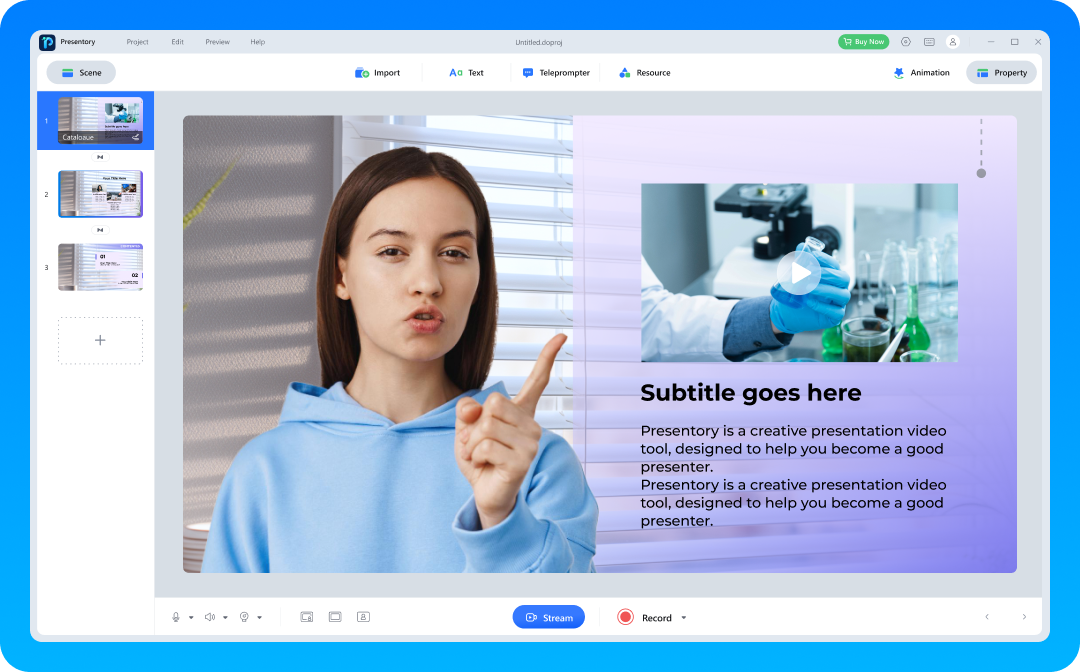
Free Download Free Download Try It Online
Key Features
Here are some of the features that make Presentory the best tool for your ESL presentation:
- Import Source Material
Import more materials for your presentations. Add images, videos, and even existing PowerPoint presentations. No need to switch between apps – everything you need is at your fingertips.
- Various Types of Font Resources
Choose from a wide selection of fonts to add a touch of creativity and professionalism to your presentations. Select the perfect font that matches your style and content effortlessly.
- Beautification Effects
It automatically recognizes portraits and adjusts your image for a polished look. Say goodbye to distracting background clutter and hello to a clean, professional appearance.
- AI Keying for Seamless Video Appearance
Removes the background image in the camera, leaving only the presenter's image. It also supports color picking, allowing you to fine-tune your video appearance effortlessly.
- Support for Popular Conferences and Live Broadcasts
Stream your ESL presentation topics with popular conferencing platforms like Zoom, Microsoft Teams, and Google Meet. Deliver your content to a global audience with ease.
- DIY Teleprompter
Adjust the window size, font color, size, and transparency to suit your preferences. Ensure a smooth and confident delivery every time.
- Noise Reduction
Eliminate distractions and ensure crystal-clear audio with Presentory's noise reduction feature. Your audience will appreciate the clarity of your message.
- Filter Effects
Add a touch of creativity to your ESL presentations with filter effects. Enhance the visual appeal of your content and keep your audience engaged.
The Bottom Line
No matter what ESL presentation topics you choose, make sure that they are something you are passionate about and can present in an engaging and informative way. With planning, you can create ESL presentations that are both educational and enjoyable for your students.
You can also add Presentory into your teaching toolkit and watch your presentations come to life with impact and engagement. With its intuitive interface and powerful features, Presentory is a good choice for ESL teachers and education influencers looking to show their expertise effectively. Try it today and watch as your students become more engaged and inspired.
You May Also Like
- 10+ Clear Business Model Canvas Templates
- Over 100 Inspiring Google Slides Themes and Ideas for Every Occasion
- How to Control Your PowerPoint by Using an Apple Watch?
Related articles
Search form
- Speaking exams
- Typical speaking tasks
Oral presentation
Giving an oral presentation as part of a speaking exam can be quite scary, but we're here to help you. Watch two students giving presentations and then read the tips carefully. Which tips do they follow? Which ones don’t they follow?
Instructions
Watch the video of two students doing an oral presentation as part of a speaking exam. Then read the tips below.
Melissa: Hi, everyone! Today I would like to talk about how to become the most popular teen in school.
Firstly, I think getting good academic results is the first factor to make you become popular since, having a good academic result, your teacher will award you in front of your schoolmates. Then, your schoolmates will know who you are and maybe they would like to get to know you because they want to learn something good from you.
Secondly, I think participating in school clubs and student unions can help to make you become popular, since after participating in these school clubs or student union, people will know who you are and it can help you to make friends all around the school, no matter senior forms or junior forms.
In conclusion, I think to become the most popular teen in school we need to have good academic results and also participate in school clubs and student union. Thank you!
Kelvin: Good evening, everyone! So, today I want to talk about whether the sale of cigarettes should be made illegal.
As we all know, cigarettes are not good for our health, not only oneself but also other people around. Moreover, many people die of lung cancer every year because of smoking cigarettes.
But, should the government make it illegal? I don’t think so, because Hong Kong is a place where people can enjoy lots of freedom and if the government banned the sale of cigarettes, many people would disagree with this and stand up to fight for their freedom.
Moreover, Hong Kong is a free market. If there's such a huge government intervention, I think it’s not good for Hong Kong’s economy.
So, if the government wants people to stop smoking cigarettes, what should it do? I think the government can use other administrative ways to do so, for example education and increasing the tax on cigarettes. Also, the government can ban the smokers smoking in public areas. So, this is the end of my presentation. Thank you.
It’s not easy to give a good oral presentation but these tips will help you. Here are our top tips for oral presentations.
- Use the planning time to prepare what you’re going to say.
- If you are allowed to have a note card, write short notes in point form.
- Use more formal language.
- Use short, simple sentences to express your ideas clearly.
- Pause from time to time and don’t speak too quickly. This allows the listener to understand your ideas. Include a short pause after each idea.
- Speak clearly and at the right volume.
- Have your notes ready in case you forget anything.
- Practise your presentation. If possible record yourself and listen to your presentation. If you can’t record yourself, ask a friend to listen to you. Does your friend understand you?
- Make your opinions very clear. Use expressions to give your opinion .
- Look at the people who are listening to you.
- Write out the whole presentation and learn every word by heart.
- Write out the whole presentation and read it aloud.
- Use very informal language.
- Only look at your note card. It’s important to look up at your listeners when you are speaking.
Useful language for presentations
Explain what your presentation is about at the beginning:
I’m going to talk about ... I’d like to talk about ... The main focus of this presentation is ...
Use these expressions to order your ideas:
First of all, ... Firstly, ... Then, ... Secondly, ... Next, ... Finally, ... Lastly, ... To sum up, ... In conclusion, ...
Use these expressions to add more ideas from the same point of view:
In addition, ... What’s more, ... Also, ... Added to this, ...
To introduce the opposite point of view you can use these words and expressions:
However, ... On the other hand, ... Then again, ...
Example presentation topics
- Violent computer games should be banned.
- The sale of cigarettes should be made illegal.
- Homework should be limited to just two nights a week.
- Should school students be required to wear a school uniform?
- How to become the most popular teen in school.
- Dogs should be banned from cities.
Check your language: ordering - parts of a presentation
Check your understanding: grouping - useful phrases, worksheets and downloads.
Do you think these tips will help you in your next speaking exam? Remember to tell us how well you do in future speaking exams!

Sign up to our newsletter for LearnEnglish Teens
We will process your data to send you our newsletter and updates based on your consent. You can unsubscribe at any time by clicking the "unsubscribe" link at the bottom of every email. Read our privacy policy for more information.
You are using an outdated browser. Please upgrade your browser or activate Google Chrome Frame to improve your experience.
7 Activities for Public Speaking That Will Boost ESL Students’ Confidence
Public speaking can be a scary thing.
Also known as glossophobia , the fear of public speaking is a major source of anxiety for roughly 75% of people worldwide .
However, public speaking is an essential skill everyone needs to have , including language learners.
The good news is that it gets easier with practice, which is why you should try out some of the below activities for public speaking that will help improve your or your students’ skills.
1. Watch TED Talks and observe body language
2. practice mimicking body language, 3. recite famous speeches, 4. give presentations in small groups, 5. prepare solo presentations using powerpoint, 6. do improvised presentations on random topics, 7. do some drama activities.
Download: This blog post is available as a convenient and portable PDF that you can take anywhere. Click here to get a copy. (Download)
Playing videos from TED Talks is a fantastic way for you to see people giving professional-quality presentations in English. The TED Talks website is filled with hundreds of different speakers, with topics ranging from the fascinating world of technology to the meaning of life.
Here’s a list of excellent TED talks presentations for ESL students , along with guidelines on how to use them in the classroom.
Think about things you like and don’t like about the presentation as you watch the video. Once the presentation has ended, write down the positive and negative aspects you observed. This will get you thinking about what kind of techniques you can implement in your own speeches, as well as which mistakes to avoid.
To give yourself or your students a well-rounded learning experience, you could add FluentU to your toolbox. FluentU is a language learning program that allows you to watch a library of authentic English videos with interactive dual-language subtitles. This can be a great way to break down what each video contains.
Good public speaking skills aren’t just about using clever words and speaking clearly— body language is equally as important . Incidentally, there’s a TED Talk you can watch covering the power of body language.
Start by brainstorming different types of body language, like gestures, postures and facial expressions. You can select actions like smiling, frowning, crossing your arms and more. After introducing body language, try matching your examples to various emotions and messages.
The results of this can be surprising because some meanings of expressions and gestures vary depending on the culture. Gestures that may seem polite could be offensive in other countries. For example, the “thumbs up” sign may seem universal for good job , but in Australia, Greece and the Middle East, it could be construed as an offensive insult.
Once you’ve elicited examples of positive and negative body language, practice how to use good body language in your presentations .
Making a speech is difficult enough, but writing a good one can feel like an impossible challenge to a beginner ESL learner.
Take some of the pressure off by reciting famous speeches. That way, you can focus on speaking skills without diving into writing or grammar.
Speeches can be taken from historical figures, social media and even movies. For beginners, you could work with a selection of famous short poems . For advanced students, try a longer speech, such as John F. Kennedy’s “Moon Speech.”
Standing alone in front of the class can be a nerve-wracking experience, even for the most gifted of learners.
If you aren’t ready for solo presentations, work in small groups so all of the attention isn’t focused on one individual learner. This can be done in just about any context, from proposing a business idea to describing how to cook your favorite food.
If you’re teaching this exercise, monitoring your students’ activity can be difficult with several groups working at the same time, so have your students assess each other.
Give every student a scoring sheet with criteria covering things like voice projection, timing, entertainment and ease of understanding. As your students listen, each group can score their partners based on this criteria. Then, you can use their scoring sheets to give feedback at the end of the class.
When you feel ready to come up with your own material, try preparing your own presentations with the help of PowerPoint.
PowerPoint slides are a great visual aid, as well as a way to make the presentation easier for nervous students.
Make sure the topic is a suitable difficulty level, and ideally, something you’re interested in. Just make sure to give enough time to write a presentation script and create the PowerPoint slides to go along with it.
I recommend planning the project in advance so there’s time to work on the presentations. Students who don’t have PowerPoint on their computer can use Google Slides as an alternative . It’s free and just as effective.
Once you or your students have built up some confidence in speaking, you can start trying some real challenges , like on-the-spot presentations.
Do this by writing out a list of different topics and putting them in a hat, bag or any other object you or the students have to stick your hand into. These topics could be anything from my dream job to the importance of a healthy diet.
Randomly select one topic, and without any preparation time, talk to the class or another audience for as long as they can about their chosen topic.
Public speaking doesn’t have to be about presentations. You can change things up a bit by trying some drama activities as well.
These could include role plays and reenactments of famous movie scenes. While acting, students still use skills like good body language, voice projection, intonation and even improvisation to make their dialogue sound natural and convincing.
While lectures and note-taking can be beneficial, nothing compares to the hands-on experience you can get from practicing public speaking.
That’s why you should implement some of the above activities for public speaking into your lessons or personal learning plans to improve confidence and overall speaking quality.
Enter your e-mail address to get your free PDF!
We hate SPAM and promise to keep your email address safe

Topic: Presentation Skills

As you can see in the slide (giving presentations)
Step into the world of presentations with this handy lesson! Students explore vocabulary for structuring presentations, read the text of a presentation and watch a video on how to communicate ideas clearly.

Presentation: putting skills into action
With this lesson plan, students practise giving a presentation in English by doing a lot of different speaking activities. The lesson is the third of the three-part series of lessons about delivering presentations.

Moving through your presentation
With this lesson plan, students learn plenty of useful phrases for presentations in English. They also prepare presentation excerpts, and learn how to start a presentation. The lesson is the second of the three-part series of lessons about delivering presentations.

How to nail that presentation
In this lesson about business presentations in English, students discuss presentation structures in depth, watch a video with tips on giving presentations, and learn useful words and phrases related to the topic. The lesson is the first of the three-part series of lessons about delivering presentations.

The city of the future is here
With this lesson plan based on a video about Toyota’s city of the future students learn some useful language for presentations and then practise their presentation skills.

The chair that conquered the world
This lesson plan about the chair that conquered the world includes a variety of tasks for students to learn new vocabulary related to describing furniture design and practise their presentation skills.

How do you like your milk?
In this lesson, students will learn advanced cooking verbs, discuss different types of milk and do an English class project.

Apple’s legendary keynotes
The objective of this lesson plan is to teach students some adjectives for describing products and show them a video analysing Apple’s legendary keynotes.
Subscribe to get premium content
Subscribe to get access to professional, ready-to-use lesson plans in both digital and printable formats . Discover a variety of lesson types: Standard Lessons, Speaking Classes, Critical Reading Club worksheets and Flipped Classroom lesson plans.
Username or Email Address
Remember Me

Effective ESL Speaking Activities for Students of All Levels
These ESL speaking activities have the simple aim of encouraging students to speak openly and freely, with minimal support, in order to achieve their communicative goals. Only in these situations can we really gauge a student’s progress and discover their strengths and weaknesses. On this page, you will find suggestions for speaking games and activities that range from simpler, more controlled interactions to wide-ranging free-speaking activities.
ESL Conversation Starters
Explore hundreds of discussion questions , organized into themed cards for easy printing and cutting out. If you find this resource valuable, consider our photocopiable conversation classes book , featuring questions across 50 topics, along with supplementary exercises to introduce relevant vocabulary and idioms that enrich discussions.
Discussion and Presentation Style Speaking Activities
Expressing opinions.
Expressing Opinions: Ideal for first classes with advanced students, this mingling activity encourages learners to exchange opinions and cards with classmates.
Question Time
Question Time: In this easy-to-set-up group discussion activity , students take turns selecting a topic and moderating the conversation.
Old School vs New School
Students compare school life today with the past in this thought-provoking discussion exercise.
The World in 20 Years: Future Predictions
Using the simple future tense , students speculate about developments across various fields.
Show and Tell
Learners bring in objects with personal significance to share their stories.
Ask the Expert
Resembling a speed-dating activity, students interview each other about their hobbies and interests.
Questionnaires and Surveys
Students create surveys and questionnaires , using them to interview their peers and foster interaction.
Other Activities
Outdoor activities.
Escape the hot, stuffy classroom and reinvigorate your students with outdoor activities they’ll enjoy.
Lying Games
Encourage laughter and fun in the classroom with speaking games that challenge students to keep a straight face.
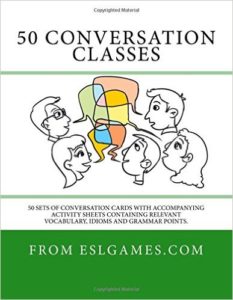
Boost Your Students’ Fluency with Our Photocopiable Conversation Cards
Looking for an engaging way to help your students practice their English speaking skills? Our ESL Conversation Questions section has hundreds of discussion questions grouped into themed cards for printing and cutting out. But if you’re serious about improving your students’ fluency, you need our A4-sized book of photocopiable conversation cards!
With questions covering 50 topics, our book is perfect for teachers who want to provide their students with meaningful opportunities to practice speaking English. Each card is designed to encourage natural conversation, boost your students’ confidence, and improve their fluency. But that’s not all – our book also includes additional exercises presenting relevant vocabulary and idioms to support the discussions.
Don’t just take our word for it – here’s what some of our satisfied teacher customers have to say:
“ My TEFL students love this book!! I quite often use it with them, to introduce the next part of the lesson. Thumbs up from me!! ” – Sarah T.
“ I love to use this in my classes so much because I always get such a surprise reaction from my students as they relate to the questions on a personal level and bring into the total discussion such rich experiences. ” – Juan M.
Ready to get started? Purchase our 50 ESL Conversation Classes book now.
4 thoughts on “ effective esl speaking activities for students of all levels ”.
Love this book! I will be taking an ESL teacher training course in a few months. In my present volunteer job, I’ve been asked to teach some English to the staff. They are all beginner to intermediate level. We are in a rural area of a poor country, so there aren’t many resources available, except what I can print out. Your book will help me do some fun conversation classes with them. Thanks for the great ideas!
This conversation class book is brilliant! I’m very happy both with the sample, which I got first, and the purchase of the whole book. I’ll be using it for years!
I`ve been using “50 conversation classes” since I started working with adult people and It`s great! We love them! thanks a lot!
Se ve muy interesante. Podría obtener una prueba gratuita?
Leave a Comment Cancel reply
Your email address will not be published. Required fields are marked *
This site uses Akismet to reduce spam. Learn how your comment data is processed .
12 Fun ESL Speaking Activities for Teens or Adults
Every language teacher knows that speaking is a core skill to teach and practice, but sometimes it can be challenging coming up with creative or engaging ESL speaking activities and games. You can use them to improve the community feeling inside the classroom , too.
Let’s dive into nine quick, easy, and fun ESL speaking activities for teenagers and adults you can integrate into your lessons or use in speaking clubs.
They are designed to be high-quality and enjoyable – and mostly suitable for online lessons, too.
Join our mailing list to receive a free ESL teaching resource every week.
Click to Join
They don’t need much preparation, but will get your students talking and help them to hone their conversational skills without even thinking about it.

1. Interview Pop
2. word racing, 3. guess who or what i am, 4. would you rather…, 5. how-to presentation, 6. living memory, 7. video talk, 8. talk about your weekend, 9. timed discussion, 10. debating club, 11. taboo words, 12. story chain.
Student level: Pre-Intermediate to Advanced Type of Lesson: Group or Individual
This is a great one for students to have fun and be creative. Put students in pairs, or you could also carry this one out in a one-one lesson.
Students choose one person they want to interview. It can be anybody of their choice, and the person doesn’t necessarily have to be alive still.
I tell students to choose someone they know a lot about or who they admire because then they’ll have more material to talk about when the speaking part of the activity comes around.
Give each student a list of ten to fifteen verbs. (Can be the same list or different) See the example:
Each student has to choose five verbs from their list.
They make a different question using one of their five verbs in each question; these questions are made for the person they want to interview.
Each question will have a different verb.
For example, let’s say a student chooses Barack Obama. They have to make five interview questions for Barack Obama, each question using a different verb from their list.
Here are some examples:
- How did you decide you want to become president?
- Did you want to continue being president after your term finished?
- What did you love about being the president?
- What would you change about the USA?
- What do you consider to be your greatest accomplishment as president?
While I usually just come up with the verbs myself, you can also find some verb lists online, along with a list of people for your students to choose from.
While the students are making their questions, go through the class and help students fix the grammatical mistakes.
This is a great activity if you are practicing question formation as a grammar topic with your students.
The students then give their partner the questions that they wrote and then assume the role of the person they wanted to interview, while their partner asks them the questions they just made.
So this means that each student answers the questions from the perspective of the person they wanted to interview, as their partner asks them the questions.
Go around and listen for mistakes.
You could also then have students report to the class the person their partner chose and how they responded to the questions.
Student level: Pre-Intermediate to Advanced Type of Lesson: Group
A very interactive and high-energy ESL speaking activity. Many students get so into it and excited that they won’t even notice they are speaking in a foreign language and won’t even have time to think about making mistakes.
All you need to prepare for the game is to write down 15-20 vocabulary terms you want to practice with your students, each term is written on a different small slip of paper. Give a stack of these slips to each group.
You can also let the students write down the vocabulary (for example on the last topic they’ve learned) but then some words might be double and they also might not think of the words you want them to practice.
Divide your students into groups of three or four and explain the rules of the game.
One player from the first group starts. This student then has one minute to explain or define as many words written on their slips to their own group as they can, without saying the word they have on the card.
They want their group to guess as many words as possible in one minute.
Each time the members of the group guess a word, they put the card down, which gets them a point, and then they take a new card and repeat the same thing.
Once the minute is over, the next group takes their turn.
After the minute is up, each group counts their points and the group with the most points wins that round.
If you have time to play more rounds, after all, words are guessed, put them back in the basket and let them play again, although this time they can only use one word to explain the word on the card, for example, a synonym or a word they associate with the word on the card.
An example might be that if the word on the card is ‘handcuff’ then they say the word ‘police’ and the other students have to guess the word ‘handcuff’.
Students only get one guess. Once a student guesses, the student must move on to the next card, whether the word was guessed correctly or not.
In the last round, they act out or pantomime the words on their cards.
Here’s a list with even more fun ESL vocabulary games for adults and kids.
While there are many other good vocabulary-charades type games that can be done with both younger and older students, this one has been my favorite.
Student level: Pre-Intermediate to Upper-Intermediate Type of Lesson: Group
This is a very simple but effective activity with no preparation needed and can be played in two versions.
It’s usually more suitable for lower-level students but can also be used in intermediate or upper-intermediate students, especially for the other variation of the activity described below.
In version one, one student thinks of a person – it could be someone in the class or a famous person, someone that everyone is likely to know – and the rest of the class asks them yes or no questions about the person until they can guess who it is.
The student who guesses the person with the least amount of questions wins.
In version two, one student goes in front of the door, while the rest of the class decides on a person. Then the student comes back in and has to ask the class yes or no questions until they can guess who the person is.
Another variation of this game is to put students in groups and describe themselves from the perspective of an object, and the other students must guess what that object is in the quickest time possible.
Each student in the group writes down an object and then speaks from the perspective of that object as if they were actually that object.
For example, if one student chooses ‘handcuffs’ they would say something like:
- “The police put me around somebody’s wrists when they break the law.”
- “I have two round rings with chains connected them.”
- “I am on a person on their way to prison.”
Students shouldn’t do any gesturing or acting on this one because that will give it away. The student who is able to guess the most objects correctly wins.
The reason I like this one more is that the students have to get a little bit more creative about expressing their ideas and they also tend to have more fun with this one.
Student level: Intermediate to Advanced Type of Lesson: Group or Individual
This is a great way to practice ‘would’ in the conditional form.
There’s a lot of different ways you can organize this one. One of the easiest ways is to just come up with some of your own ideas (5-10 should be enough), type them out, and cut them up into cards.
Go around the class and have a student draw a card, read it aloud, and then call on another student to answer it.
The goal is to make the “Would you rather” questions funny, crazy, interesting, or controversial. Think about what kind of questions you think would be fun to discuss if you were learning a foreign language.
Bookmark our list of 110 “would you rather” questions, and you will never run out of great questions to discuss.
Here are a few examples:
- Would you rather give up your mobile phone or your pet?
- Would you rather have $50,000 that is legal or $150,000 that is illegal?
- Would you rather be the funniest person in the room or the most intelligent?
- Would you rather have your first child when you are 19 years old or when you are 45?
As stated before, you can make up your own. If you are doing a specific topic for your lesson, then you can try to make them as closely related to the topic as possible.
For example, if the topic for your lesson is Meet the World’s Oldest Ice Hockey Player , then you might want to prepare some ‘would you rather’ questions about age or about hockey:
- Would you rather stop aging at 17 or 35?
- Would you rather date someone ten years older or ten younger?
- Would you rather be a famous football player or a famous hockey player?
Give each group or pair of students the same card and have each of them state their opinion about the topic on the card.
You can give them a few minutes to take notes on their opinion and what they want to say before starting. Then students go around and say their opinion and support their argument.
This is one is sure to bring some good conversations and even laughs in your class.
You can also teach phrases on how to express opinions, such as:
- “In my opinion…”
- “I believe that…”
- “In my eyes…”
- “From my point of view…”
In addition to this, you could also assign students to make their own “Would you rather…” topics for the class or other groups. Make sure they keep them appropriate!
Help facilitate the conversations and ask follow-up questions while students are speaking.
This activity is great for a number of reasons: it’s simple to assign and explain, effective for students to develop speaking, and fun because it’s on a topic they’re interested in.
It’s also practical because they’re teaching the class how to do something or how something works.
Basically, all you need to do for ESL speaking activities like this one is have students choose some topic. It can be any appropriate topic according to their wishes.
Then they give a five-minute presentation on that How-to topic.
In order to get students cooperating together, you could also put them in pairs and have them decide on and organize the speech together.
Here are some of the ones my students have done before and they turned out to be great:
- How to cook [a food]
- How to play [a sport]
- How to travel cheap
- How to do a magic trick
- How to live healthily
There are some great tips you can share with your students on giving a presentation in a foreign language.
Have students prepare the speech at home or during the lesson, and then have them present their topic during the next lesson.
You could take notes on their speaking or pronunciation mistakes while they present and go over them after the presentation.
Student level: Pre-Intermediate Type of Lesson: Group
This is a game based on the classic board game “memory” designed for lower-level students.
Two students go out of the room (Student A and Student B). The rest of the class gets together in pairs.
If you have an uneven number of students, one group can be in three.
Each pair chooses a word according to the learning objective.
For example, if your students are learning about food, then in pairs they will mutually agree on a meal or a food they both like. Then the two students come back into the classroom and these two students play against each other to gain points.
To gain points, Student A starts off and asks any student in the class “What do you like eating?” and that student answers “I like eating…”, and then Student A asks another student what they like to eat.
If the second student likes the same thing, then Student A gets one point. Then Student B goes and tries to match the pairs based on the food they mutually chose together.
This is a fun game to practice vocabulary and simple phrases.
You can make the game more interactive if students make gestures and movement demonstrating the type of food. For example, they gesture peeling a banana if the food they chose is ‘banana’.
Other good questions are:
- What is your favorite subject?
- What do you like doing in your free time?
- What time is it?
Student level: Pre-Intermediate to Advanced Type of Lesson: Group or Individual
Find a YouTube video topic that you think would be interesting for your students. I would choose a relatively short video (two to five minutes), or something like a TedTalk.
Make some preview discussion questions about the topic presented in the video, go through them with students before watching, and then watch the video together.
You can then have some questions prepared based on the video content and some post-discussion activities while going through some of the important vocabulary terms from the video.
Students tend to love working with videos and there are so many good ones out there nowadays.
Using video is effective because it brings the outside world to your students, and they can generate some great discussions in class, inspiring students to speak their mind and share their opinions and ideas.
Browse our full archive of ESL resources and printables.
Student level: Beginner to Intermediate Type of Lesson: Group
This activity is a better choice if your students are happy talking but maybe are a bit nervous speaking in front of a class:
Split the class into pairs.
Students need to discuss their weekend with their partner.
Use only English!
You need to be observant with this type of activity. Keep an eye on each student’s talk time.
If you are finding some students are much more talkative than their partners, maybe set a time limit for how long each student can talk for before switching. This ensures that everyone gets a fair chance to practise.
Information gap activities are great to practice conversation; get more ideas here.
This is another simple yet great activity for building confidence in speaking!
Give the student a topic card, for instance, “Talk about your favorite place.” or “What’s your favorite band or artist?”
The student has a certain amount of time to prepare some ideas for what they will say.
The student then has to talk about that topic for a chosen amount of time.
When starting out with this activity, make sure to give more time for preparation and less time for the presentation. 5 minutes of preparation time and 1 minute of the presentation should be plenty.
With time, you can reduce the preparation time or increase the presentation time.
Prepare a list of controversial topics, and two opposing views about each topic.
Split your students into pairs or small groups (each with an even number of students). Split each groups into two parties. Assign a topic to each group: each party has to hold an opposite view.
Give them some time to prepare arguments for their standpoint. 5 to 10 Minutes should be enough.
Then let each group debate their topic in front of the class. One party starts voicing their first argument, then the other answers.
Each statement shouldn’t exceed 30 seconds – use a stopwatch with a countdown, so students know when they have to stop.
The debate is over after a set time – for example 5 minutes – or when the parties stated all their arguments.
After each debate, the whole class votes which party was more convincing and won the debate.
If it’s an individual lesson, you and the student play the opposite parties – no final vote then.
Make sure to prepare topics according to the fluency level of your students. The topics can be rather serious and controversial, or fun and weird.
Here are a couple of examples:
Current and serious topics:
- Classroom instruction vs. Homeschooling
- Self-driving cars: smart or dangerous
- Buy local vs. buy online
- Death sentence: yes or no
- iOS vs. Android
Fun and weird topics:
- Vanilla vs. chocolate ice-cream
- Get up early vs. go to bed late
- Have no kids vs. have 5 kids
- Travel to Mars vs. to the earth’s core
- Sommer vs. Winter
Student level: Beginner to Intermediate Type of Lesson: Group
Finally, and absolute classic activity. Split your students into groups, each with at least 3 three students.
Prepare a list of words. For each word, think about 3-5 words which can be used to describe the original word. These can be synonyms, adjectives or any kind of related terms.
- Weather – rain, cloud, sun, forecast, outside
- hungry – food, stomach, eat, restaurant, thirsty
- to run – fast, quick, walk, race, legs
Write the words on cards.
Now, one student has to take one card and explain the word to the other in their group. Here’s the catch: He must not use one of the words on the card (also, no parts or variations of the words.). He must not use gestures, facial expressions or voices. He has to circumscribe the word using other verbal expressions.
The rest of the group have to guess the word. Set a time for each round, like one minute. One group has to guess as many words as possible within that time; each guess is one point.
When the explaining student uses one of the taboo words (or other taboo means), he has to skip the current word and continue with the next card.
Count the points after each round. Then, the next group has its turn. The game is over, when each student in each group had their turn to explain words. Sum up the points; the group with the most wins.
Other possible game modes: Let the groups guess one word alternating, and set a 30 seconds time limit for each guess. Or let a student explain a word to the whole class, and who guesses it first, gets a point.
Student level: Intermediate to Advanced Type of Lesson: Group
This activity does not only help students develop their speaking and listening skills, it also fosters critical thinking skills, creativity, and imagination.
Here’s how it works:
- Divide the group into small teams of 3–4 people each.
- Give each team a starting sentence, such as “Once upon a time, in a land far, far away.”
- Set a time limit, such as 5 minutes.
- Each team must take turns adding one sentence to the story, building from the previous sentence.
- The team that completes the most coherent story within the time limit wins.
- To make it more challenging, you can also include a specific vocabulary theme for the story, such as “animals” or “travel”, or you can include a twist, such as “the story must be a horror story”.
- After the activity, teams present their story to the class.
- Encourage the class to ask questions about the story to the teams.
6 thoughts on “12 Fun ESL Speaking Activities for Teens or Adults”
Thank you so much! Some of the suggestions I have already used with my students, but I did get new tips too! will try them out.
Great ideas to get my hgh school students speaking. Thanks so much
Great… These activities are really interesting ones and are helping me a lot. Thank You So Much for Uploading….
Great activities! Greeting from Mexico.
Thank you! This is very clearly written with a lot of additional ideas. Useful! :)
Thanks so much for sharing. Lots of new ideas for me.
Leave a Comment Cancel Reply
Your email address will not be published. Required fields are marked *

ESL Speaking
Games + Activities to Try Out Today!
ESL Speaking: Games, Activities, and Resources for English Teachers
Welcome to ESL Speaking! It’s the ultimate site for TEFL/EFL/ESL/English teachers who are looking for some fun, interactive, engaging and student-centred ESL speaking games and activities, along with a whole array of other great resources, including textbook recommendations. If you’re looking for ESOL speaking activities and games, look no further than ESL Speaking!
This website is for teachers, by teachers and is run by Jackie Bolen, author of more than 50 books for ESL teachers on Amazon . Here’s just a glimpse of what you can find. If you are interested in becoming an ESL teacher, check out this article .
ESL Speaking Games and Activities for Adults
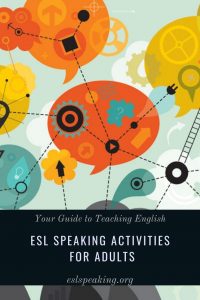
If you’re looking for some of the best TEFL speaking activities or games for teenagers, university students, or adults, then you’ll want to have a look here:
ESL Speaking Games & Activities for Adults
You’re sure to find exactly what you need for your speaking or conversation class, whether it’s a grammar-focused class , a holiday-themed lesson , or more. Have a look around and if you don’t find exactly what you need, get in touch and I’ll put an article together for you.
If you’re an English teacher, then you already know that the key to better classes is a wide variety of interesting activities. This helps keep students engaged in English class and makes learning far more memorable. My goal is to give you a huge variety of ESOL speaking ideas that you can use in your class today!
Some of the most popular articles for English speaking activity and game ideas include the following:
ESL Conversation Activities for Adults
English Discussion Starters for Adults
ESOL Speaking Games and Activities for Children
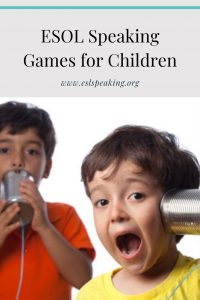
ESL Speaking Games for Children
If you teach English to kids, then you’ll definitely want a variety of engaging games and activities. But, it’s sometimes difficult to keep coming up with fresh things to bring to class. That’s where ESL Speaking comes in.
We have enough games and activities to get you through an entire course in style. Check this out to see all of the best ideas for ESL speaking practice:
ESL Speaking Games and Activities for Children
Have a look around and you’ll definitely be able to find what you need for that next TEFL class. My goal is to make teaching easy by having a variety of top-quality English practice games and activities at your fingertips.
Here are some of the most popular articles for teaching children. You can find English conversation games, activities for very young learners, and ideas for teaching children how to speak English in a fun way.
Hot Potato Game
ESL Kindergarten Games and Activities
TEFL Speaking Games for Kids
ESL Speaking Textbook Recommendations
A great class often starts with a great ESL book. That’s why you’ll certainly want to check out these articles. I’ve been teaching for more than 15 years and have seen ALL the textbooks. Check out my top recommendations here:
ESL Textbooks for Adults
ESL Textbooks for Children
Grammar and Parts of Speech-Focused Activities
Do you know that lesson on prepositions or the past tense that you’ve taught for the 20th time? Maybe you’ve noticed that the ESL textbooks have all the same, old activities. Why not spice things up and add some variety into your speaking or English conversation classes? Here are some of the most popular resources:
ESL Preposition Games
ESL Past Tense Activities
WH Question Games
Subject Object Pronoun ESL Activities
Resources for English Teachers

English teacher resources
Along with all the ESOL Speaking activities, games and textbook recommendations, you can find even more at ESL Speaking! Under Resources for English Teachers, you can find out about the supplies you need to teach English, book recommendations, online TEFL courses and more.
Check out all you need for teaching English abroad, or in your home country. You’ll find everything you need to do it in style:
Some of the most popular articles included under TEFL teacher resources include the following options:
81 Ways to Make your ESL Speaking Class Better
Online TEFL Course
Language Teaching Methods and Approaches
Rolling Carts for Teachers
The Best Teacher Bags
Books by Jackie Bolen
Let me introduce myself. I’m Jackie Bolen and I’ve been teaching English for the past 15 years. I taught in South Korea for 10 years to every age and level of students. I’ve been in Vancouver, Canada for the past few years, teaching at private English academies and working on books and activity ideas for teachers.
My real passion is ESL speaking activities and games. I love to use a variety of interesting things in my classes to make learning English fun and engaging for my students. Here are some ESL speaking-focused books that you might be interested in:

Jackie Bolen on the Let’s Talk TEFL Podcast
If you’re a fan of podcasts, then you’ll definitely want to check out Jackie on the Let’s Talk TEFL podcast, along with Jennifer Booker Smith. Have a look right here:
Get in Touch With Jackie Bolen at ESL Speaking

Do you have some ESOL speaking activities to recommend? Some ESL speaking activity that I haven’t talked about? A question about English teacher games? Please get in touch for everything speaking activities ESL:
About and Contact for ESL Speaking
Last update on 2024-04-25 / Affiliate links / Images from Amazon Product Advertising API
Our Top-Seller

As an Amazon Associate, I earn from qualifying purchases.
More ESL Activities

Animal Names: Animals that Start with the Letter A

This or That Food Questions (WYR Food Edition)

Would You Rather Thanksgiving Questions

Top 30 Funny Jokes for Kids | Clean Jokes for Children
About, contact, privacy policy.
Jackie Bolen has been talking ESL speaking since 2014 and the goal is to bring you the best recommendations for English conversation games, activities, lesson plans and more. It’s your go-to source for everything TEFL!
About and Contact for ESL Speaking .
Privacy Policy and Terms of Use .
Email: [email protected]
Address: 2436 Kelly Ave, Port Coquitlam, Canada
120 Presentation Topic Ideas Help You Hook Your Audience
Updated: January 15, 2024
Published: August 09, 2023
Cooking is easy. The puzzle is figuring out what to eat. As soon as you know that, you can get started. The same holds for presentations. The sooner you can whip up a good, informative, and catchy topic, the easier the rest of the process becomes.

Pick a good topic that resonates with you and your audience to set a strong foundation. But select the wrong topic, and it becomes difficult to connect with your audience, find mutual interests, or hold their attention.
So, let’s learn how to develop thought-provoking and relevant topics for your presentations. You’ll also find some best practices to make your presentation memorable.

10 Free PowerPoint Templates
Download ten free PowerPoint templates for a better presentation.
- Creative templates.
- Data-driven templates.
- Professional templates.
You're all set!
Click this link to access this resource at any time.
Table of Contents
How to Choose a Great Presentation Topic in 5 Steps
120 presentation topic ideas, 5 presentation tips.

4. Choose an appropriate presentation style.
There are many ways to present a topic. Your personality, the topic at hand, and your audience’s personas will help you determine which style would best fit you and your audience.
Select a presentation style that will communicate the main idea clearly and have a lasting impact on your audience.
For instance, explore a freeform style presenter by Sir Ken Robinson.
5. Engage with your audience.
Work on your presentation skills to make a strong connection with your audience, get through to them and leave a mark.
Think of the presenter as the link between the topic and the audience. A strong or a weak presenter can make a difference between a presentation being a thriving success or a boring failure.
Hone your skills by engaging and interacting with your audience. Make them feel like a part of the presentation and not just spectators. 70% of marketers have found presentations with interactive content to be more effective than those without.
Here are a few ways you can make your presentation interactive:
- Start your speech with uncommon questions to your audience. Involve them from the get-go, like ask to raise their hands if X.
- Make eye contact to build credibility and show confidence. Don’t stare at your slides or notes. Smile occasionally and talk to the audience directly.
- Have an active and confident body language. Don’t stand in the same place the entire time. Move around the stage.
- Don’t be monotonous. Speak as you would to a colleague — with enthusiasm.
- Ask close-ended questions in between to keep the audience engaged without losing time. Address them using their names to keep things interesting.
- Share personal experiences and stories that your audience will find fascinating and relatable.
- Practice thoroughly before you present so you’re fluent with the material and delivery.
- Energy and excitement can be quite contagious. Make sure you exude enough to spread some to your audience.
Feeling Inspired Yet?
Now you have all the right ingredients for choosing amazing topics and a hundred ideas to drive inspiration from. So, go ahead and start cooking presentations that will blow your audience away.
Don’t forget to choose a super-relevant topic and add meaty information. Do it with excitement to make it enjoyable for you and your audience. Best of luck!
![esl speaking presentation topics Blog - Beautiful PowerPoint Presentation Template [List-Based]](https://no-cache.hubspot.com/cta/default/53/013286c0-2cc2-45f8-a6db-c71dad0835b8.png)
Don't forget to share this post!
Related articles.
![esl speaking presentation topics 17 PowerPoint Presentation Tips From Pro Presenters [+ Templates]](https://blog.hubspot.com/hubfs/powerpoint-design-tricks_7.webp)

17 PowerPoint Presentation Tips From Pro Presenters [+ Templates]
![esl speaking presentation topics How to Write an Ecommerce Business Plan [Examples & Template]](https://blog.hubspot.com/hubfs/ecommerce%20business%20plan.png)
How to Write an Ecommerce Business Plan [Examples & Template]
![esl speaking presentation topics How to Create an Infographic in Under an Hour — the 2024 Guide [+ Free Templates]](https://blog.hubspot.com/hubfs/Make-infographic-hero%20%28598%20%C3%97%20398%20px%29.jpg)
How to Create an Infographic in Under an Hour — the 2024 Guide [+ Free Templates]
![esl speaking presentation topics 20 Great Examples of PowerPoint Presentation Design [+ Templates]](https://blog.hubspot.com/hubfs/powerpoint-presentation-examples.webp)
20 Great Examples of PowerPoint Presentation Design [+ Templates]

Get Buyers to Do What You Want: The Power of Temptation Bundling in Sales

How to Create an Engaging 5-Minute Presentation
![esl speaking presentation topics How to Start a Presentation [+ Examples]](https://blog.hubspot.com/hubfs/how-to-start-presenting.webp)
How to Start a Presentation [+ Examples]
![esl speaking presentation topics How to Create the Best PowerPoint Presentations [Examples & Templates]](https://blog.hubspot.com/hubfs/Powerpoint%20presentation.jpg)
How to Create the Best PowerPoint Presentations [Examples & Templates]

The Presenter's Guide to Nailing Your Next PowerPoint
![esl speaking presentation topics How to Create a Stunning Presentation Cover Page [+ Examples]](https://blog.hubspot.com/hubfs/presentation-cover-page_3.webp)
How to Create a Stunning Presentation Cover Page [+ Examples]
Marketing software that helps you drive revenue, save time and resources, and measure and optimize your investments — all on one easy-to-use platform
My Speech Class
Public Speaking Tips & Speech Topics
169 Five-Minute Topics for a Killer Speech or Presentation

Jim Peterson has over 20 years experience on speech writing. He wrote over 300 free speech topic ideas and how-to guides for any kind of public speaking and speech writing assignments at My Speech Class.
There are pros and cons to giving a 5-minute presentation. One good thing is the length. Long presentations can easily become boring, and you have a much better chance of keeping your audience engaged from beginning to end than with a 5-minute speech.
In this article:
Food & Drink
Relationships, social media, supernatural, list of topics for a 5-minute speech or presentation.

Choosing a topic is extremely important. To help you getting started, here is a list of some killer topics for 5-minute speech or presentation.
- Why it’s better to adopt a pet from a shelter
- Choosing the perfect leash for your dog
- What is the best food for your pet?
- How much exercise does your pet need?
- The horror of puppy mills
- Bringing back endangered species
- How long are giraffes in labor
- Domestication of horses
- Picking the right vet
- Sleeping with your dog
- Why should you get goats in pairs
- Ethics of zoos
- The domestication of dogs
- How to keep a goldfish alive for a long time
- How to choose the right pet
- Why cats are so independent
- When to get a dog
- What kind of dog is best for a household with children
- Why therapy animals work
- How to find the money to go to college
- How much control should the federal government have over curriculum design?
- How to choose a college
- Ideas for narrowing down a career choice
- When to declare a major
- Benefits of charter schools
- Why charter schools are bad
- Negative effects of school vouchers
- Attracting the right people to the teaching profession
- Discipline in the classroom
- Memory tricks that work
- Why homework is bad
- Should students still have to use the books in the library?
- Why cursive should still be taught in schools
- Textbooks vs. tablets
- Benefits of going to a trade school
- Are there positives to taking a gap year?
- The problem with low teacher pay
- Social media in the classroom
- Benefits of integrating apps into the classroom
- The importance of attachment
- How to compromise on names for your kids
- What is the ideal age to start a family
- How important are grandparents
- Traveling with children
- Strategies for potty training
- How to help a child with nightmares
- Middle child syndrome
- How many kids should you have?
- How to recognize a gifted child
- When your child doesn’t like to eat
- How to encourage good eating habits
- When to intervene with a bully
- Being active in your child’s school
- The benefits of aunts and uncles
- When family falls apart
- The first days with a new baby
- When to call the doctor
- Caring for an ailing parent
- Balancing home and career
- When to start saving for retirement
- IRA vs. Roth IRA
- When should you start saving for your children’s college education?
- Crowdfunded loans vs. the bank
- How Kickstarter changed everything
- Using your HSA
- How to apply for a mortgage
- Improving your credit score
- How to negotiate a raise
- Renting vs. buying
- How does compound interest work?
- How to ask for a promotion
- When is it time to get a new job?
- What to do when you find out a coworker makes more than you
- How much of a down payment on a house do you really need?
- Living on minimum wage
- Is it better to lease or buy a new car?
- How to budget for a new car
- What to do when you lose your job
- Using credit cards responsibly
- Is rare meat safe?
- Vegan vs. vegetarian
- Microbrews vs. standard brewing
- How to make your own wine
- What are hops?
- Best plants for a backyard garden
- When to transplant sprouts
- Bananas and plantains
- How to make a brine for pickling
- Where did brunch begin?
- Why pineapple belongs on a pizza
- When to order in
- Planning a menu
- Meal planning and grocery lists
- Is free range really better?
- The perfect macaroni and cheese
- Growing your own herbs
- How to make your own pasta
- How to make cookies that are softer
- Benefits of drinking black coffee
- Benefits of a gluten-free diet
- Is the paleo diet accurate?
- Effects of not getting enough sleep
- Are meal subscription services worth it?
- Downsides to Crossfit
- Benefits of yoga
- How to meditate
- Can therapy change the way your mind works?
- Are GMOs really dangerous?
- The truth about diet soda
- Importance of hydration
- Why cleanses don’t work
- Best juice diet
- Most effective exercise for burning calories
- Do essential oils really work?
- The history of television
- When the railway was king
- Thwarted assassination attempts
- The first Olympics
- Media during World War II
- Military advancements between World War I and World War II
- War photographers
- Things you didn’t learn in history class
- Historical lies
- The early Internet
- Why podcasts are great
- Most unbiased news channel
- When do people tune into the news most
- How relevant are women’s magazines?
- Cable vs. Netflix
- How worried should you be about your browsing history?
- How to limit screen time
- Why it’s bad to use your smartphone right before bed
- Apple vs. Android
- The best age to get married
- How to get an amicable divorce
- Finding a roommate
- Splitting financial responsibilities evenly among the household
- How to have a happy marriage
- Choosing your family
- How to fight effectively
- Signs of an abusive relationship
- What to look for in a spouse
- When to let it go
- How to overcome self-doubt
- Faking confidence
- Becoming comfortable with yourself
- How to say no
- Relaxation techniques
- Controlling anxiety
- Qualities of a leader
- The importance of self-care
- Identifying triggers
- How to eliminate negativity
- Making new habits
- Ethics of posting pictures of your children on social media
- How Internet ads are tailored to you
- How to advertise your business on Facebook
- Privacy and social media
- How to protect your personal information
- When to allow your kids to get their own social media accounts
- Why you shouldn’t post your location on social media
- How to use a hashtag
- Uncovering Twitter Bots
- Snapchat etiquette
- Proof that aliens exist
- Debunking crop circles
- Is Bigfoot real?
- Proof that ghosts exist
Good 2-Minute Speech Topics for Students
13 All-Time Best TED Talks
23 thoughts on “169 Five-Minute Topics for a Killer Speech or Presentation”
Ideal Teacher
is life really a blessing?
This has helped me so much for my English class thank you!
Why personal (private) rules are helpful
I got an A!!!!!
Risks of abortion Wage gap How social media impacts education/mental health Why it’s important to have a good stable mental health Do teenagers really spend all their time on their phones Gsce requirements unfair or reasonable
Here is a kind of a dense topic, domestic abuse. Why does it happen? What are some ways to identify a abusive relationship? How does it affect families? Why is the abuser abusive?
We have presentation next week. I can’t think about the topic. Please help me!
i want a topic that involves supernatural: HELP
Is water wet?
death, what if the earth loses air entirely for five minutes, what is the most common death.
I have presentation next two day concerning with my classroom. I must choose five topics but i can’t think how to choose these topics. Please! help me
Tanks for giving me an A in drama
so helpful thank you
thanks this helped with my speach at school
i need a best topic to present on that is educational to consumer science and food nutrition students. can i please be assisted
what if the earth stopped spinning pros and cons of being an artist how Gen Z affected slang why people are afraid of the dark why knowing how to play an instrument is beneficial/not needed
Here’s a controversial one: are trans, intersex and non-binary people getting the same right as every else?
I have a presentation this week I don’t understand how to find a good title please help me I’m a diploma student the speech must have more than 10 minutes
How do create presentation for famous place in Sri Lanka
i need something for my oral communication class. it must be attention grabbing and not an argument. please help
I need ideas on a slide show presentation, a kid appropiate topic.
Pls I need more ideas on self help
hi lol i like these topics but i need a trendy one like something new or like a natural phenomene or someth like that… 🙂
Leave a Comment
I accept the Privacy Policy
Reach out to us for sponsorship opportunities
Vivamus integer non suscipit taciti mus etiam at primis tempor sagittis euismod libero facilisi.
© 2024 My Speech Class

101 ESL Conversation Topics to Break the Silence

ESL Conversation Starters
Looking for that missing element that will help your ESL conversation classes sparkle, shine and speak English?
Leading an engaging ESL conversation class isn’t something you can just pull off at the drop of a hat. But these tricks can help you go from zero to ESL hero. As a matter of fact, the one big secret is having…
Ready? Drumroll, please.
101 ESL conversation topics from a hat.
101 ESL Conversation Topics From a Hat
How many times have you been in an ESL conversation class and just couldn’t get your students to speak?
In the classroom and in everyday life, we need conversation starters or ice breakers to end the silence. Arguably, there’s nothing stranger than silence in a conversation class!
Here’s how you do it:
Before you start the school year, dedicate some time to preparing a list of free talking topics (see below).
First, print the conversation topics below. Second, cut each topic and put them in a hat. Finally, have them attached to your hip whenever you’re in need.
You can either open the whole classroom for discussion or have them speak in pairs. Furthermore, these ESL conversation topics are great for filling in any extra time at the end of the class or ice breakers at the start of a lesson.
And if you’d like more free ESL activities for your classroom, don’t forget to check out our other lists to engage your students in English. All are free and can be used for any purpose.
- 43 Free ESL Worksheets that Enable English Language Learners
- 13 Free ESL Lesson Plans to Master Your ESL Classes
- 67 Free ESL Games to Teach English Like an All-Star
Either way, the goal is to get them practicing in English.
Culture Differences for Kids
- High schools (Do students wear special school attire like uniforms? Can students drive to their high school? Can students drink water in class?)
- Country work ethic (How long are typical work hours? Do students work after graduating?)
- School clubs (What unique school clubs are there? Which club are you in? Why did you choose that club?)
- Holidays (What is your favorite holiday? What type of food do you eat on specific holidays?)
- Jobs (What jobs exist? Is it easy to get a job after graduation? Is it easy to find a job now?)
- Pop culture (Who are pop culture icons in your home country?)
- Video games (Do you play video games? What types of video games are popular?)
- Parenting and punishment (What kind of punishment have you received at school or home? Do you believe in physical punishment?)
Culture Differences for Adults
- Restaurant tips (Are tips at restaurants common? How much is a reasonable tip?)
- Work dinner parties (Do wives and husbands attend work parties?)
- Gestures (What are some unique gestures (thumbs up, middle finger, etc) in your country?)
- Gift exchange (When you travel, is it common to exchange gifts? How about Christmas or any other holidays?)
- Living with parents (How old do kids live with their parents?)
- Greetings (How do you greet in your country? Do you bow or do handshakes?)
- Safety and crime (Do you think your neighborhood is safe? What kind of crimes happen in your area?)
- Punctuality (How often are friends late? How about buses and trains? Is it rude being late?)
- Food and health (What is a typical meal? How healthy is it? Are gyms becoming more popular?)
- Sports (How do sports players show respect after a game? Are there any unique sports in your country?)
- Multiculturalism (Is your country multicultural? Is multiculturalism a good thing?)
- Gender discrimination (Do women and men make the same amount of money for doing the same job? Is there much gender discrimination in your home country?)
If you…
- If you had one wish, what would it be?
- If you were rich, what would you do?
- If you could be a celebrity for a day, which celebrity would you be?
- If you were the principal at school, what would you change?
- If you could go anywhere in the world, where would you go and why?
- If you were on a deserted island, what would you bring and why?
- If you could be any animal for a day, what would it be and why?
- If you could have any superpower, what would you pick and why?
- If you could pack only 3 items for your next trip, what would they be?
- If you could change one thing about yourself, what would it be?
- If you could travel to the moon, would you like to go?
- If you win the lottery, what is the first thing you would do?
- If you owned an island to yourself, what rules would you implement?
- If they could pick a Halloween costume to dress up as on Halloween, what would it be?
- If you could be born at a different time period, when would it be?
- If you could change the past, would you do it?
- If you could make a movie, which celebrity would you pick as yourself?
- If you found a large amount of money, what would you do?
- If you could change anything about your country, what would you change?
- If you could be born in another country, which one would you pick?
- If you could do your dream job 10 years from now, which job would you choose?
Have you ever…
- Have you ever traveled out of your home country?
- Have you ever cried when watching a movie? If yes, which one?
- Have you ever experienced culture shock?
- Have you ever wanted to get a tattoo or piercing?
- Have you ever laughed so much that it made you cry?
- Have you ever been lost and couldn’t find directions?
- Have you ever fallen in love? If no, do you want to find love?
- Have you ever won a trophy? If yes, which competition did you win?
- Have you ever read a book that changed your life?
- Have you ever been to Disneyland or an amazing theme park?
- Have you ever had a dream that felt like it was real?
- Have you ever seen something supernatural or paranormal?
- Have you ever ridden a horse?
- Have you ever had imaginary friends when you were young?
- Have you ever had to go to the hospital?
- Have you ever been outside your home country?
- Have you ever experienced a natural disaster?
- Have you ever owned a pet?
- Have you ever donated anything to the poor?
- Have you ever seen a car accident?
Would you rather…
- Would rather be very intelligent or very good-looking?
- Would you rather have a pet dog or cat?
- Would you rather grow up going to school in your home country or another one?
- Would you rather be a professional athlete or a celebrity actor?
- Would you rather live forever or until 100 years old?
- Would you rather live in the mountains or on the beach?
- Would you rather bungee jump or skydive?
- Would you rather be rich or find true love?
- Would you rather walk backward or talk backward for the rest of your life?
- Would you rather explore the oceans or outer space?
- Would you rather live in an apartment or a house?
- Would you rather be invisible or super fast?
- Would you rather live in a country that is always cold or hot?
- Would you rather live in the city or a small town?
- Would you rather be a jack-of-all-trades or master one?
- Would you rather ride an elephant or swim with dolphins?
- Would you rather be rich and depressed or broke and happy?
- In the past or future, when would you rather travel?
- Would you rather eat rice or bread with every meal?
- Would you rather use the internet or books as your main source of information?
Controversial
- How do you deal with stress?
- What is the best advice you have ever received?
- Do you think aliens exist?
- Is climate change real?
- What age is best to start dating?
- What personality traits do you want in your boyfriend or girlfriend?
- Have you ever had a problem with bullying?
- Are girls smarter than boys?
- In the future, how many children do you want to have?
- What makes a good teacher?
- Who was your hero when you were a child?
- What is the worst purchase you have made?
- Would you rather know how you die or when you die?
- What was the best holiday you’ve been on?
- Is there any strange food in your country?
- What are some inventions you hope to see in the future?
- What is the most embarrassing moment of your life?
- Would you ever try online dating?
- What is on your bucket list?
- Do you believe in any religions?
- When was the last time you cried?
With 5 Minutes Left, What Do You Do?
All things considered, 101 ESL conversation topics from a hat is a fantastic end of the class time filler.
When you run out of things to do, pull out the hat and pick a topic. Otherwise, your class would just be sitting there twiddling their thumbs.
Strangely enough, a lot of teachers don’t equip themselves with back-up activities.
Now, you don’t have to sweat it out and watch the clock tick until the bell rings.
30 Comments
That sounds interesting
Amazing and inspiring on how to have extra activities for backup.
Thank you so much for sharing the topics.
I am a senior citizen trying to revive my teaching skills. You did it for me.
I’m glad I found this. Thank you so much!
Very useful.
There are many valuable questions here, and some which are inappropriate for some students. I think it is part of the teachers job to know their students and choose topics appropriate to their age, gender, culture etc. On the whole there are many inspirational topics to choose from here as a springboard to develop your own, perhaps more relevant, questions while still appreciating the efforts and work of the original source.
On the whole, very useful. I have taught in Asia for 20+ years. On the whole, STFU about love and dating. You come across as a lech. Plus countries like China and Japan do not need any more Western cultural poison.
thank you… thank you… so much… it’s really very helpful…
Very hepful! Thank you!
Sorry but “Is climate change real” is NOT a topic for conversation! It’s like saying ‘Is COVID real’ !!!! I’d suggest instead, ‘How do we deal with climate change’
Very helpful thanks for taking the time.
Great material! Thanks a million!
Thanks for the ideas of the topics and questions. All of them can help me a lot in my conversation class.
Thank you very much, this is very useful for my classes 🙂
Great questions.
As for potentially inappropriate questions, I would hope that every teacher has enough sense to decide what is appropriate or not for their students depending on age, maturity level, cultural norms/taboos, class dynamic, etc.
I’ve had classes where I would never think of asking some of these questions, and I’ve had classes where we’ve probably discussed all of these topics along with issues that are way more controversial. And those were some of my best classes.
Consider your class and use your best judgement.
Thanks for sharing!
Thanks for your work, splendid to liven up conversation in class. Thanks for the kindness of your generosity to share this. I believe it is crucial to be thankful and to contribute, and not just criticize. Thanks again
While there are some useful questions here, I’d be wary about asking questions regarding love and dating, as well as outdated gender ideology that reflects one’s own personal biases. For example, the gender wage gap has been debunked by all credible economists. 5 minutes googling will reveal to you why some men and women earn more than other men and women, and it’s nothing to do with gender. So with that and similar questions you’re bound to come into conflict with students with traditional conservative feminist views on wage differences, or ruin the group dynamic of a class of mixed gender students.
Wow……Mind blowing questions…..My ESL classes are gonna be fun-filled hereafter
These are wonderful and diverse topics to break the ice in a ESL class. Thank you for great selection of topics.
This is so amazing thank you so much!
These questions were so helpful, I would love to read more topics if any. Thank you
I loved it! thank you so much, I’ve been learning English for 9 months and my skill at talking has been improving every day more thanks to these topics
I find most of these questions helpful and interesting, so I thank you for that, but there are questions that I think are inappropriate to ask your students, particularly the questions about love, dating, and crying. I also found multiple grammar errors in this article. For example:
“Have you ever had imaginary friends when you were young?” “In the past or future, when would you rather travel to the ?”
Depending on your class, age and level of maturity, I agree the questions about love and dating could be inappropriate. But of course, every situation is different.
I was talking with a 12 year old in KSA whose younger 8 year old brother had gone to a farm earlier in the day. It turns out he goes to this farm every day.
Kids Love animals.
ask if You had a farm,
what kind of animals would You have? describe the animals. describe their behavior. what color is each animal? size? what would You feed each animal?
This is a good place to start. just my idea.
Nice organized and interesting ideas. Thank you
I found these tips very useful and interesting. I will be using some of your suggestions. Thanks.
They are very useful questions. Thank you and I hope there are more
Leave a Reply Cancel reply
Your email address will not be published. Required fields are marked *
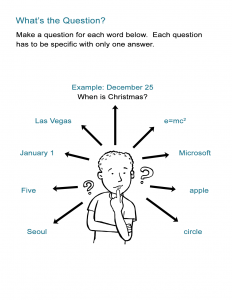
Asking Questions
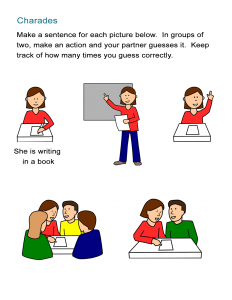
Free Talking Topics
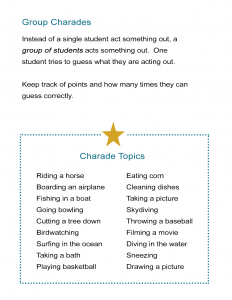
Group Charades
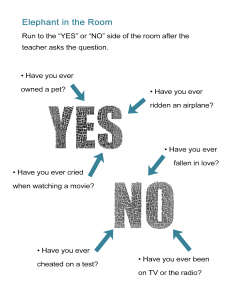
Have You Ever?

No Subtitles
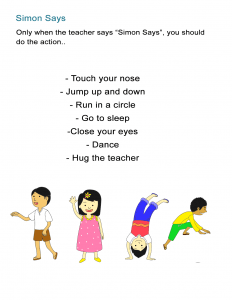
Talking Time Bomb

The Classroom Movie
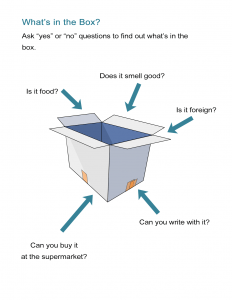
What’s in the Box ?
Like what you're reading?
Need a good presentation topic? Here are hundreds of them.
Get your team on prezi – watch this on demand video.
Anete Ezera November 04, 2022
If you’re looking for good topics for presentations, you’ve landed on the right page. In this article, you’ll find plenty of good presentation topics, tips on choosing the most suitable topic for you, and essential design elements to make your presentation a success.
Many factors go into an excellent presentation. You need to have confident body language and engage your audience to hold their attention. You also need eye-catching visual aids like images, data visualizations, GIFs, and others (all of which you can find in Prezi ), not to mention a great opening to grab attention and a strong closing line to stay memorable. However, the most essential aspect of your presentation is the topic. It’s the core of your presentation, so it has to be strong, insightful, attention-grabbing, and appealing to yourself and your audience in order to evolve into a successful presentation everyone will love.

How to choose a good presentation topic
There are millions of topics you could create a presentation on, but what defines a good topic? If you’re struggling to either come up with a good topic for a presentation or you can’t decide between multiple ones, here are a few questions you should ask yourself before choosing a topic.
What’s the goal of your presentation?
When you’re choosing a topic, consider the meaning behind it. Ask yourself what the purpose of talking about this topic is, and what you want to say about it. Whatever topic you choose to present, the conclusion needs to provide a takeaway or lesson you want to communicate to your audience. A meaningful goal will make your presentation more memorable.
Are you interested in the topic?
If you’re not interested in the topic, others won’t be curious either. Interest, enthusiasm, and passion enrich your presentation and are noticeable when presenting. Interest shines through and inspires others to find the topic as fascinating as you do. Think about the last time you saw someone sharing something they were passionate about – their excitement drew people in to pay closer attention to what they were saying.
When choosing a topic, you need to find it or a particular angle of it interesting for yourself. For example, perhaps you’re not a pop music enthusiast, but you’re passionate about studying cultural phenomena. In this case, you can talk about pop music’s influence on early 2000s youth culture.
Will your audience find this topic relatable?
While you have to find the topic you’re presenting interesting, you also have to think about your audience. When choosing a subject, consider your audience’s background in terms of demographics, interests, culture, and knowledge level about the topic. Think about what others will find fascinating and relevant, so they’re not bored or confused during your presentation.
Do you have prior experience or knowledge about this topic?
Personal experiences are always great to share in a presentation, providing your unique perspective for anyone listening. While you can easily prepare your presentation based on a quick Google search, it won’t make the same lasting impact on your audience. Choose a topic you have some prior knowledge about, or have an interesting opinion you can share with others. It’ll make your presentation more engaging and memorable.

Ideas for good presentation topics
It’s not easy to come up with a good presentation topic from scratch. It’s much easier to get inspired from other good presentation topics to build your topic on. Whether you’re looking for presentation ideas for work, about me presentation ideas, unique or easy presentation topics, you’ll find them all here.
Without further ado, here are some good presentation topics to choose from or get inspired by.
Presentation topics about social media
- The role of social media in portraying gender stereotypes
- How social media impacts our body image
- How social media shaped Gen Z
- The most significant differences between the Facebook and TikTok generations
- The negative effects of social media
- The positive impacts of social media
- The effects of social media on behavior
- How social media impacts our physical (or mental) health
- How social media has shaped our understanding of mass media
- Should we teach about social media in schools?
- The rise of social media influencers
- How AR Instagram filters impact our self-image
- How to go viral on social media?
- The origins of social media echo chambers
- Social media as a news outlet
Author: Ish Verduzco
Presentation topics about movies
- How movies influence our understanding of good and evil
- Beauty standards represented in movies
- How female characters are depicted in Hollywood movies
- How horror movies and global fears have developed through time
- The adverse effects of romance movies
- How movies have changed our understanding of the Western culture
- Charlie Chaplin and the silent movie era
- The globalization of culture: Hollywood vs. Bollywood
- The psychology behind the music in films
- The ethics of using animals in movies
- Social media’s influence on the film industry
- The history of filmmaking
- The role of color in movies
- The cultural impact of romance movies
- How are gender stereotypes depicted in Hollywood movies?
Author: Cinto Marti
Presentation topics about music
- The impact of pop music on beauty standards
- Should digital music be free for everyone?
- The psychology behind the music in advertisements
- The effectiveness of sound therapy
- Can music inspire criminal behavior?
- The psychological effects of metal music
- The origins of K-pop
- How does music influence our understanding of the world?
- Can music help in the learning process?
- The positive effects of classical music
- The history of hip hop
- Why is music education essential in schools?
- The psychological benefits of playing piano
- Can anyone become a famous musician?
- The role of music in fashion
Author: Prezi Editorial
Presentation topics about health
- The link between food and mental health
- Inequality in the healthcare system
- Myths about healthy practices
- Simple practices that help you stay healthy
- Health education in schools: Should it change?
- Toxic positivity and mental health
- The impact of superfoods on our health
- The psychology behind unhealthy eating habits
- Sex education in schools: Why should we have it?
- How to trick yourself into getting better: The placebo effect
- How to strengthen your immune system
- How to tell if someone is depressed
- The health benefits of regular exercise
- The impact of junk food on mental health
- Stress-caused diseases
Author: Prezi Education Team
Presentation topics about human psychology
- What is social depression?
- What triggers panic attacks?
- The impact of testosterone on aggressive behavior
- How to overcome social anxiety
- Differences in the functioning of the brain of a child and adult
- The impact of violent video games on children’s brain development
- How does the use of social media influence our attention span?
- How to overcome childhood trauma
- The influence of marijuana on the human brain
- How does behavioral therapy work
- The psychology behind fame
- The causes of personality disorders
- The differences in brain functioning between men and women
- What happens in therapy sessions?
- The psychology of substance abuse
Presentation topics about self-development
- The impact of exercise on productivity
- How to deal with stress
- How to deal with procrastination
- The positive effects of meditation
- Why new–year’s resolutions don’t work
- How to overcome bad habits
- The impact of negative thoughts
- The negative effects of self-criticism
- The role of creativity in self-development
- Benefits of journaling
- How to learn something fast
- How to be mindful
- The importance of curiosity
- How to become more self-aware
- Why it’s essential to spend time with yourself
Author: Nir Eyal
Presentation topics about education
- What are the advantages and disadvantages of online education?
- The positive effects of a gap year
- Should university education be free?
- Inequality in education access
- How language learning benefits brain development
- Emerging gender issues in education
- The importance of socialization in school
- School bullying and student development
- The benefits of reading
- Is the education system broken?
- What you don’t learn in college
- The link between education and brain development
- The history of schools
- The gender gap in STEM
- The connection between equality in education and economic growth
Presentation topics about culture
- Is graffiti a form of art or street vandalism?
- Cultural diversity in the workplace
- The impact of culture on gender roles
- The issue with orientalism
- Are humans the only species that has culture?
- How do different cultures view death?
- The ethical issues of pop culture
- The impact of culture on personal development
- Sexism in different cultures
- The impact of globalization on local cultures
- The viral spread of the #metoo movement
- The history of subcultures
- The problem with romanticizing toxic relationships in movies
- 90s pop-culture influence on fashion trends
- The evolution of cultural psychology
Author: Devin Banerjee
Presentation ideas for work
- What it’s like to be a digital nomad?
- How to deal with workplace conflicts
- The secret to a productive day
- How to set achievable goals
- The importance of diversity in a workplace
- The positive effects of creative thinking at work
- How to give constructive feedback
- The characteristics of a valuable team member
- Inequality and the glass ceiling
- Racial discrimination in the workplace
- Work habits of different cultures
- How is work perceived in various countries?
- Technological development and the future of work
- The importance of a healthy work/life balance
- The rise of health problems in office work
Author: Charles Huang
Presentation topics about hybrid work
- The positive effects of hybrid work on work/life balance
- Is hybrid work the future work model?
- How to stay connected in a hybrid work model
- The challenges of hybrid work nobody talks about
- How to stay productive when working from home
- The social effects of hybrid work
- The economic impacts of hybrid work
- Case study: Hybrid work model in [company]
- What causes Zoom fatigue?
- The problem with online meetings
- Is hybrid work better than remote work?
- How to develop a close relationship with colleagues in a hybrid work model
- What kind of company culture is best for a hybrid work model?
- Is hybrid work sustainable?
- Cybersecurity consideration for hybrid working
Author: Barbie Brewer
Presentation topics about public speaking
- The importance of body language in public speeches
- How to appear confident when you’re not
- How to become a better orator
- The use of eye contact in public speaking
- Breathing exercises that will calm you down before public speaking
- The benefits of public speaking
- Ways to improve public speaking skills
- How to leave a great first impression on stage
- How to engage your audience during a public speech
- How to best structure your public speech
- How to end your presentation speech
- Can anyone learn to be good at public speaking?
- How to prepare for a public speech
- What not to do right before a public speech
- How to address a controversial topic in a public speech
Author: Prezi Team
Presentation topics about entrepreneurship and leadership
- The main principles of a good leader
- The impact of leadership skills on professional performance
- The mistake every entrepreneur makes
- How to successfully lead a cross-cultural team
- How to celebrate inclusivity in a diverse team
- What are the common personality traits of a successful entrepreneur?
- The impact of entrepreneurship on the global economy
- The characteristics of a leader
- The most common challenges of entrepreneurship
- Can anyone learn to become a successful leader?
- What affects new venture growth?
- The psychology of leadership
- What is crowdsourcing?
- The benefits of being an entrepreneur
- Common mistakes leaders make
Author: Jill Sinclair
Presentation topics about technology
- The rise of technological development
- Is technology addictive?
- Should we use drones for military and non-military purposes?
- The sustainability of electric cars
- What are deepfakes?
- Limitations of AI machines
- The future of programming
- Ethical issues of AI
- The future of AR in business
- How VR can be used in the medical field
Author: David Vandegrift
Sales presentation topics
- How to make a cold email intro
- What is sales enablement?
- How to build better relationships with customers
- The best way to improve pipeline management
- Coaching via verbal and written role-play
- How to plan cold calls
- What’s a deal-breaker for most customers?
- All about personalized coaching
- How to manage objections
- How to close more deals
- How to keep your prospects engaged
- Effective sales communication strategies
- How to conduct a competitor analysis
- The most valuable sales skills
- What soft skills do you need to become a successful sales rep?
Author: Cindy McGovern
Easy presentation topics
- Benefits of daily exercise and how to incorporate it into your routine
- Simple and nutritious meal recipes
- Tips for improving time management and productivity
- The importance of recycling
- The history of a local landmark or festival
- Ways to reduce stress
- Exploring different types of renewable energy sources and their impact on the environment
- The basics of budgeting and saving money for future goals
- The benefits of social media for professional use
- Tips for overcoming stage fright
- How to start a meditation practice
- The impact of technology on modern society
- The basics of personal finance
- The health benefits of a plant-based diet
- The history of Earth Day
Good how to presentation topics
- How to create a successful social media marketing strategy
- How to give a persuasive presentation
- How to create effective and engaging content for your blog
- How to discover your strengths and weaknesses
- How to use project management tools to increase productivity
- How to make the most out of boring meetings
- How to build a personal brand
- How to conduct effective market research
- How to use data analytics to improve decision-making
- How to improve your decision-making process
- How to write a winning proposal
- How to create a visually stunning presentation
- How to manage stressful situations at work
- How to make friends as an adult
- How to network at work events
About me presentation ideas
- My journey to becoming who I am today
- My passion for [insert topic or activity]
- My career aspirations and goals
- My travels and adventures around the world
- My hobbies and interests outside of work/school
- My role models and influences
- My strengths and weaknesses
- My favorite books, movies, and TV shows
- My proudest achievements and accomplishments
- My favorite childhood memories
- My family and friends
- My education and academic background
- My volunteer and community service experience
- My personality traits and values
- My vision for the future and how I plan to achieve it
Author: Adam Grant
Student presentation ideas
- The history and evolution of video games
- The history and cultural impact of tattoos
- The impact of social media on body image and self-esteem
- The effects of globalization on local cultures and economies
- The role of education in promoting social justice and equity
- The ethical implications of autonomous weapons in warfare
- The impact of mass media on society and culture
- The causes and effects of deforestation on biodiversity and climate change
- The history and cultural significance of dance in different parts of the world
- The psychology of addiction and recovery
- The impact of the gig economy on labor rights and job security
- The history and impact of feminism on gender equality
- The benefits and drawbacks of renewable energy sources
- The impact of colonialism on indigenous cultures and identities
- The role of technology in promoting global connectivity and intercultural understanding
Author: Edward Quinn
How to create a good presentation
If you know what you want to present on, it’s time to create an impactful presentation that grabs everyone’s attention. Presentation design plays a crucial role in how your presentation is received and remembered. To stand out and leave a memorable impact on your audience, create a Prezi presentation. Instead of a linear, slide-based presentation, offer an engaging and dynamic storytelling experience to your audience. Breathe life into your presentation with motion, zoom, and spatial relationships. When creating your presentation, consider the following three essential elements:
Visuals play a significant part in presentation design. They evoke emotions, make a memorable impact, and give more context to the story. Not to mention, 65% of people are visual learners , so visual aids are helpful when explaining a complex topic.
In your presentation, include different types of visuals, such as images, videos, GIFs, and stickers, all of which you can find in Prezi’s content library. When selecting your visuals, consider what’s relevant and brings additional value to the story. Only add what’s meaningful and necessary. A video or image at the right place and time will enrich the viewing experience and make your presentation more memorable.
The layout of your presentation is the structure of your story. It’ll help you introduce the topic, intrigue your audience, and unfold the layers of your topic one by one until you disclose your main arguments and summarize the presentation. A good presentation layout has a hierarchical, chronological, or logical flow that leads the viewer from start to finish.
If you’re creating a Prezi presentation, you can create a dynamic storytelling experience by experimenting with your layout. Instead of going from slide to slide, you can zoom in and out of topics and experiment with different shapes, animations, and effects that draw the viewer into your story world. Here’s an example of a Prezi presentation with a great storytelling layout:
Author: Lydia Antonatos
Data visualizations can elevate your presentation from being a good one to a great one. By providing data behind your arguments, you’ll appear more trustworthy and confident in your audience’s eyes.
Add charts, graphs, interactive maps, and more to your presentations with Prezi Design. You can choose from a wide selection of charts and maps to illustrate your data. With interactive elements, you’ll be able to engage your audience and make a memorable impact.
Engaging visuals, a well-structured layout, and relevant data visualizations will provide a great starting base to create a memorable presentation. Discover other tips and tricks that make your presentation effective and capture people’s attention.
Choosing a topic for a presentation isn’t easy. When selecting a topic, think about the goal of your presentation, your interest and knowledge about the topic, and whether or not your audience will find it relevant and interesting for them. Also, get inspired by other topics that’ll help you figure out what you want to talk about. Lastly, when creating your presentation, consider the impact of visuals, layout, and data visualizations. To simplify the creation process, follow the step-by-step process of making a presentation with helpful tips and resources.

Give your team the tools they need to engage
Like what you’re reading join the mailing list..
- Prezi for Teams
- Top Presentations

- Intermediate
- All Conversation Types Reading (1) Vocabulary (47) Grammar (5) Pictures (2)
- All Topics Activities (5) Animals (3) Children (2) Education (1) Entertainment (6) Exercise (1) Family (1) Food and Drink (9) Health (4) Leisure (14) Life (13) Money (1) Music (3) Random (6) Shopping (1) Sport (4) Transport (1) Travelling (5)
- All Levels Beginner (55) Intermediate (267) Advanced (87)

Sweets and Candy

Choosing Your Favourite Pet

Have you ever

When was the last time…

Birthday Presents

How often do you…

Simple Past

Zoos and Children

Discovering Delicious Sandwiches

Simple Present

Japanese Food


English Current
ESL Lesson Plans, Tests, & Ideas
- North American Idioms
- Business Idioms
- Idioms Quiz
- Idiom Requests
- Proverbs Quiz & List
- Phrasal Verbs Quiz
- Basic Phrasal Verbs
- North American Idioms App
- A(n)/The: Help Understanding Articles
- The First & Second Conditional
- The Difference between 'So' & 'Too'
- The Difference between 'a few/few/a little/little'
- The Difference between "Other" & "Another"
- Check Your Level
- English Vocabulary
- Verb Tenses (Intermediate)
- Articles (A, An, The) Exercises
- Prepositions Exercises
- Irregular Verb Exercises
- Gerunds & Infinitives Exercises
- Discussion Questions
- Speech Topics
- Argumentative Essay Topics
- Top-rated Lessons
- Intermediate
- Upper-Intermediate
- Reading Lessons
- View Topic List
- Expressions for Everyday Situations
- Travel Agency Activity
- Present Progressive with Mr. Bean
- Work-related Idioms
- Adjectives to Describe Employees
- Writing for Tone, Tact, and Diplomacy
- Speaking Tactfully
- Advice on Monetizing an ESL Website
- Teaching your First Conversation Class
- How to Teach English Conversation
- Teaching Different Levels
- Teaching Grammar in Conversation Class
- Members' Home
- Update Billing Info.
- Cancel Subscription
- North American Proverbs Quiz & List
- North American Idioms Quiz
- Idioms App (Android)
- 'Be used to'" / 'Use to' / 'Get used to'
- Ergative Verbs and the Passive Voice
- Keywords & Verb Tense Exercises
- Irregular Verb List & Exercises
- Non-Progressive (State) Verbs
- Present Perfect vs. Past Simple
- Present Simple vs. Present Progressive
- Past Perfect vs. Past Simple
- Subject Verb Agreement
- The Passive Voice
- Subject & Object Relative Pronouns
- Relative Pronouns Where/When/Whose
- Commas in Adjective Clauses
- A/An and Word Sounds
- 'The' with Names of Places
- Understanding English Articles
- Article Exercises (All Levels)
- Yes/No Questions
- Wh-Questions
- How far vs. How long
- Affect vs. Effect
- A few vs. few / a little vs. little
- Boring vs. Bored
- Compliment vs. Complement
- Die vs. Dead vs. Death
- Expect vs. Suspect
- Experiences vs. Experience
- Go home vs. Go to home
- Had better vs. have to/must
- Have to vs. Have got to
- I.e. vs. E.g.
- In accordance with vs. According to
- Lay vs. Lie
- Make vs. Do
- In the meantime vs. Meanwhile
- Need vs. Require
- Notice vs. Note
- 'Other' vs 'Another'
- Pain vs. Painful vs. In Pain
- Raise vs. Rise
- So vs. Such
- So vs. So that
- Some vs. Some of / Most vs. Most of
- Sometimes vs. Sometime
- Too vs. Either vs. Neither
- Weary vs. Wary
- Who vs. Whom
- While vs. During
- While vs. When
- Wish vs. Hope
- 10 Common Writing Mistakes
- 34 Common English Mistakes
- First & Second Conditionals
- Comparative & Superlative Adjectives
- Determiners: This/That/These/Those
- Check Your English Level
- Grammar Quiz (Advanced)
- Vocabulary Test - Multiple Questions
- Vocabulary Quiz - Choose the Word
- Verb Tense Review (Intermediate)
- Verb Tense Exercises (All Levels)
- Conjunction Exercises
- List of Topics
- Business English
- Games for the ESL Classroom
- Pronunciation
- Teaching Your First Conversation Class
- How to Teach English Conversation Class
Discussion Topics for Agreeing & Disagreeing (ESL)
These are conversation topics I have used to create discussion in my ESL class. They could also be used as speaking topics for speeches . These speaking topics go well with activities to practice giving opinions (agreeing, disagreeing, interrupting, and changing the topic). For a few activities for agreeing and disagreeing, visit here .
If you are looking for discussion questions, I have created a longer list (containing similar ideas) on the conversation questions page .
General Topics for Discussion or Speeches
- English is easy to learn.
- Money is more important than love.
- Students should be required to study English in elementary school.
- Violence is sometimes necessary.
- Personality is more important than beauty.
- People who live in apartments shouldn't own pets.
- No job is perfect.
- Everyone is good at something.
- We are not alone in the universe.
- Life was better 20 years ago.
- The most important thing about a job is the salary.
- You can know a lot about a person from the clothes he or she wears.
- Teachers should be able to use physical punishment.
- Global warming isn't real.
- There are actions we can take to stop global warming.
- There are no such things as ghosts.
- Everyone has the right to have an opinion even if the opinion is false according to well-known facts.
- People get offended too easily nowadays.
- What goes around comes around. (If you do good, good will come to you / If you do bad, bad things will happen to you.)
- Parents should never hit their children.
- Table manners and etiquette have become less important in the 21st century.
Crime Discussion/Speech Topics
- Smoking marijuana should be legal.
- Police officers should not carry guns.
- Criminals who take a life (kill someone) should spend their entire life behind bars.
- Graffiti is art, not crime.
- Prisoners are sent to jail to be reeducated.
Gender Issues Discussion/Speech Topics
- Men should open doors for women.
- Men and women can never really be equal.
- Women are better at teaching children than men are.
- Men are smarter than women.
- Companies should have quotas on their executive boards to make them 50% female.
- At a bar, men should initiate conversation with women (and not the other way around).
Health Discussion/Speech Topics
- People who get plastic surgery usually look worse later in life.
- Nowadays, people are too dependent on medicine.
- This country's healthcare system needs a lot of improvement.
- If you feel unwell, you should go to the doctor.
- Western medicine is more effective than Eastern medicine.
- People who use acupuncture are crazy.
- People should be more concerned about their health.
- Beauty products, vitamins, and mineral supplements generally provide the benefits they promise.
- Home remedies can be just as useful as medicine from a pharmacy.
- Obesity is a disease.
- Humans shouldn't drink the milk of other animals such as cows.
- There should be an extra tax on unhealthy food.
- Worrying about cancer can give you cancer.
Politics Discussion/Speech Topics
- Life would be better without government or rules.
- People should be able to criticize the government.
- The government has the right to monitor phone calls and e-mails.
- The government should increase environmental regulations on businesses.
- Women should be allowed to wear a niqab (or face veil) to civic ceremonies.
- We should tax the rich to help the poor.
- New Canadians who become terrorists should lose their citizenship and be sent back to where they came from.
- The government should be stricter on immigration.
- Canada should not participate in the war against ISIS.
- Voting for a political party that is unlikely to win the election is wasting your vote.
Enjoy your discussion.
- Conversation topics created by Matthew Barton of Englishcurrent.com (Copyright)
Related Pages
- Conversation Questions
- Argumentative Essay Topics (Business-Related)
EnglishCurrent is happily hosted on Dreamhost . If you found this page helpful, consider a donation to our hosting bill to show your support!
12 comments on “ Discussion Topics for Agreeing & Disagreeing (ESL) ”
Little water was left in the pot,….?(question tag)
…, wasn’t it? (but it seems very strange to use a question tag here)
You’re missing “there”; (there was) little water left in the pot, wasn’t there?
This sentence has a negative meaning so it should be:
(There was) Little (not much) water was left in the pot, was there?
As the word”Home” has to function as “Adverb of place and Noun”, and you explained that when it works as adverb of place, the preposition ” To” is not used and when it is used as “noun” , preposition is possible,so school is also adverb of place now if we say that school has only form “Noun” and it does not have adverb form, Is it correct
Hello. ‘school’ does not have an adverb form. It is only a noun. Therefore, verbs that require a preposition use a preposition when school is the object (“I went to school / I arrived at school.”). You cannot omit the prepositions. If that’s what you meant, then you are correct.
Unless you are using the word school for the services it offers. Then you say I go to school. No prep
And what is “to”?
Put thing abt covid
Actually, there is an adverb form of school, “schoolishly.” It is, however, quite rare and pretty nearly archaic. It seems mainly to have been used to characterize the manners and thoughts of the so-called “schoolmen” (a.k.a., scholastic philosophers.) Wordhippo features the term as do older dictionaries.
The English subject is a bit complicated since it requires time and a lot of practice. Money is more important than health but it is necessary for life since many people depend on it. For teachers to teach English in elementary school, this great help for students is necessary to continue learning. Violence is not good but many times anger takes advantage of ourselves by taking revenge for which the act turns into violence. Personality is important Since we must have values in our life And try to be a better person, beauty is natural. Not every job can be perfect as it can also be dangerous and very expensive. We are not alone in the world because there are many people around us but our personality is unique. We can all be good at something, it’s just that for some things we won’t have the ability to do everything perfectly. Money is one of the most necessary elements since if we work it is because we need the salary and trying to do things with love and commitment is the best. The happiness of another person does not have to offend me since we can all be happy as we want. Regarding the phrase that says what you sow, what you reap is very true, the world is turning around and what we do today, right or wrong, will have our reward sooner or later.
English is easy to learn: The english subject its such a beautifu world, you can learn a lot of things about it and you learn to aprecciate it with the pass of the day, It is easy at the way you want to learn it and study. No job is perfect: Because sometimes your body get tired of to many things and at this point you just want to through away those works issues, but also we have other days when we realize that we are blessing of have this job, its a constant feelings of high and lows. Women are better at teaching childrens than men are: No, because God gave to each one of us, the intelligence and the habbility for do all the things and ideal that we have in life, we just need the strengh and good vibes to do it. What goes around comes around: I have always used to think that those things that you sow, you harvest too, thats why we always have to do the good things to our behaviors.
Leave a Reply Cancel reply
Your email address will not be published. Required fields are marked *
350+ Presentation Topics That Will Appeal to Any Audience
I like building and growing simple yet powerful products for the world and the worldwide web.
Published Date : December 4, 2020
Reading Time :
A presentation can be nerve-wracking, may it be for first-timers or pros, as you must turn a critical issue into a dynamic, persuasive, and informative one. Before you enhance your Oratory skills <p data-sourcepos="3:1-3:215"><strong>Oratory skills</strong>, also known as public speaking skills, refer to the ability to effectively communicate with an audience through spoken language. These skills encompass a range of areas, including:</p><br /><ul data-sourcepos="5:1-9:0"> <li data-sourcepos="5:1-5:140"><strong>Delivery:</strong> Clear pronunciation, strong vocal projection, appropriate volume and pacing, engaging body language, and confident presence.</li> <li data-sourcepos="6:1-6:153"><strong>Content:</strong> Well-organized and structured presentations, persuasive arguments, use of storytelling and humor, and tailoring messaging to the audience.</li> <li data-sourcepos="7:1-7:142"><strong>Communication:</strong> Active listening, responding to questions effectively, fostering audience engagement, and adapting to different settings.</li> <li data-sourcepos="8:1-9:0"><strong>Emotional intelligence:</strong> Understanding and managing your own emotions, recognizing and responding to the emotions of your audience, and creating a positive and impactful connection.</li> </ul> <h2 data-sourcepos="10:1-10:33"><strong>Importance of Oratory Skills:</strong></h2> <ul data-sourcepos="12:1-16:0"> <li data-sourcepos="12:1-12:148"><strong>Career advancement:</strong> Strong communication skills are crucial for success in various professions, from leadership roles to client presentations.</li> <li data-sourcepos="13:1-13:128"><strong>Building relationships:</strong> Effective communication strengthens interpersonal connections and fosters trust and understanding.</li> <li data-sourcepos="14:1-14:111"><strong>Persuasion and influence:</strong> Oratory skills allow you to present your ideas convincingly and inspire action.</li> <li data-sourcepos="15:1-16:0"><strong>Confidence and self-esteem:</strong> Mastering public speaking can boost confidence and self-belief in various situations.</li> </ul> <h2 data-sourcepos="17:1-17:30"><strong>Developing Oratory Skills:</strong></h2> <ul data-sourcepos="19:1-24:0"> <li data-sourcepos="19:1-19:116"><strong>Practice and rehearsal:</strong> Regularly practice your speeches and presentations to refine your delivery and timing.</li> <li data-sourcepos="20:1-20:168"><strong>Join a public speaking course:</strong> Structured learning environments like <strong>public speaking courses</strong> provide expert guidance and opportunities for real-time feedback.</li> <li data-sourcepos="21:1-21:132"><strong>Work with a speech coach:</strong> <strong>Speech coaches</strong> offer personalized advice and tailored exercises to address specific skill areas.</li> <li data-sourcepos="22:1-22:112"><strong>Observe effective speakers:</strong> Analyze speeches of admired speakers to learn from their techniques and style.</li> <li data-sourcepos="23:1-24:0"><strong>Seek feedback:</strong> Actively seek constructive feedback from trusted individuals to identify areas for improvement.</li> </ul> <h2 data-sourcepos="25:1-25:38"><strong>Benefits of Strong Oratory Skills:</strong></h2> <ul data-sourcepos="27:1-32:0"> <li data-sourcepos="27:1-27:107"><strong>Increased effectiveness:</strong> Communicate your ideas clearly and persuasively, achieving desired outcomes.</li> <li data-sourcepos="28:1-28:91"><strong>Audience engagement:</strong> Capture and hold attention, leading to a more impactful message.</li> <li data-sourcepos="29:1-29:117"><strong>Greater confidence:</strong> Deliver presentations with poise and self-assurance, projecting credibility and leadership.</li> <li data-sourcepos="30:1-30:116"><strong>Enhanced career opportunities:</strong> Stand out in interviews and presentations, opening doors to career advancement.</li> <li data-sourcepos="31:1-32:0"><strong>Personal growth:</strong> Develop valuable communication skills applicable to various life situations.</li> </ul> <h2 data-sourcepos="33:1-33:298"><strong>Remember:</strong></h2> <p data-sourcepos="33:1-33:298"><strong>Oratory skills</strong> are not something you're born with but rather a set of skills that can be honed and developed through dedication and practice. By investing in your communication skills, you can unleash your inner orator and unlock numerous personal and professional opportunities.</p> " href="https://orai.com/glossary/oratory-skills/" data-gt-translate-attributes="[{"attribute":"data-cmtooltip", "format":"html"}]" tabindex="0" role="link">oratory skills and overcome your fear of public speaking , you must brainstorm excellent, fun topics for your presentation.
When doing a presentation, you cannot start a thing without coming up with a presentation topic . It is harder to find the best subject than prepare the lecture, as you need to be specific about the topic you want to present.
Besides Oratory skills <p data-sourcepos="3:1-3:215"><strong>Oratory skills</strong>, also known as public speaking skills, refer to the ability to effectively communicate with an audience through spoken language. These skills encompass a range of areas, including:</p><br /><ul data-sourcepos="5:1-9:0"> <li data-sourcepos="5:1-5:140"><strong>Delivery:</strong> Clear pronunciation, strong vocal projection, appropriate volume and pacing, engaging body language, and confident presence.</li> <li data-sourcepos="6:1-6:153"><strong>Content:</strong> Well-organized and structured presentations, persuasive arguments, use of storytelling and humor, and tailoring messaging to the audience.</li> <li data-sourcepos="7:1-7:142"><strong>Communication:</strong> Active listening, responding to questions effectively, fostering audience engagement, and adapting to different settings.</li> <li data-sourcepos="8:1-9:0"><strong>Emotional intelligence:</strong> Understanding and managing your own emotions, recognizing and responding to the emotions of your audience, and creating a positive and impactful connection.</li> </ul> <h2 data-sourcepos="10:1-10:33"><strong>Importance of Oratory Skills:</strong></h2> <ul data-sourcepos="12:1-16:0"> <li data-sourcepos="12:1-12:148"><strong>Career advancement:</strong> Strong communication skills are crucial for success in various professions, from leadership roles to client presentations.</li> <li data-sourcepos="13:1-13:128"><strong>Building relationships:</strong> Effective communication strengthens interpersonal connections and fosters trust and understanding.</li> <li data-sourcepos="14:1-14:111"><strong>Persuasion and influence:</strong> Oratory skills allow you to present your ideas convincingly and inspire action.</li> <li data-sourcepos="15:1-16:0"><strong>Confidence and self-esteem:</strong> Mastering public speaking can boost confidence and self-belief in various situations.</li> </ul> <h2 data-sourcepos="17:1-17:30"><strong>Developing Oratory Skills:</strong></h2> <ul data-sourcepos="19:1-24:0"> <li data-sourcepos="19:1-19:116"><strong>Practice and rehearsal:</strong> Regularly practice your speeches and presentations to refine your delivery and timing.</li> <li data-sourcepos="20:1-20:168"><strong>Join a public speaking course:</strong> Structured learning environments like <strong>public speaking courses</strong> provide expert guidance and opportunities for real-time feedback.</li> <li data-sourcepos="21:1-21:132"><strong>Work with a speech coach:</strong> <strong>Speech coaches</strong> offer personalized advice and tailored exercises to address specific skill areas.</li> <li data-sourcepos="22:1-22:112"><strong>Observe effective speakers:</strong> Analyze speeches of admired speakers to learn from their techniques and style.</li> <li data-sourcepos="23:1-24:0"><strong>Seek feedback:</strong> Actively seek constructive feedback from trusted individuals to identify areas for improvement.</li> </ul> <h2 data-sourcepos="25:1-25:38"><strong>Benefits of Strong Oratory Skills:</strong></h2> <ul data-sourcepos="27:1-32:0"> <li data-sourcepos="27:1-27:107"><strong>Increased effectiveness:</strong> Communicate your ideas clearly and persuasively, achieving desired outcomes.</li> <li data-sourcepos="28:1-28:91"><strong>Audience engagement:</strong> Capture and hold attention, leading to a more impactful message.</li> <li data-sourcepos="29:1-29:117"><strong>Greater confidence:</strong> Deliver presentations with poise and self-assurance, projecting credibility and leadership.</li> <li data-sourcepos="30:1-30:116"><strong>Enhanced career opportunities:</strong> Stand out in interviews and presentations, opening doors to career advancement.</li> <li data-sourcepos="31:1-32:0"><strong>Personal growth:</strong> Develop valuable communication skills applicable to various life situations.</li> </ul> <h2 data-sourcepos="33:1-33:298"><strong>Remember:</strong></h2> <p data-sourcepos="33:1-33:298"><strong>Oratory skills</strong> are not something you're born with but rather a set of skills that can be honed and developed through dedication and practice. By investing in your communication skills, you can unleash your inner orator and unlock numerous personal and professional opportunities.</p> " href="https://orai.com/glossary/oratory-skills/" data-gt-translate-attributes="[{"attribute":"data-cmtooltip", "format":"html"}]" tabindex="0" role="link">oratory skills and PowerPoint mastery, you need to have informative and fun topics for presentations that can influence the audience. Watch this and get more ideas about informative topics:
One of the best ways to nail a presentation is to choose the best presentation topics that fit your expertise and target audience.
How to Choose a Good Topic
Choosing the best one out of informative presentation topics can be daunting and confusing if you want to create an Informative Speech <p data-sourcepos="3:1-3:401">An <strong>informative speech</strong> aims to educate and enlighten an audience on a specific topic. Unlike persuasive speeches, it does not advocate for a particular opinion or belief but focuses on clearly and impartially presenting information. <strong>Professional speaking</strong> often employs informative speeches to share knowledge, explain processes, or introduce new developments within their field.</p><br /><h2 data-sourcepos="5:1-5:17"><strong>Key Elements:</strong></h2> <ul data-sourcepos="7:1-12:0"> <li data-sourcepos="7:1-7:112"><strong>Clear and concise information:</strong> Present complex topics in a way that is easily understood by your audience.</li> <li data-sourcepos="8:1-8:113"><strong>Engaging delivery:</strong> Use storytelling, humor, and multimedia elements to captivate your audience's attention.</li> <li data-sourcepos="9:1-9:125"><strong>Credible sources:</strong> Support your claims with evidence from reliable sources like research papers, experts, or statistics.</li> <li data-sourcepos="10:1-10:122"><strong>Organized structure:</strong> Clearly define your central topic, present key points logically, and summarize your main ideas.</li> <li data-sourcepos="11:1-12:0"><strong>Tailored approach:</strong> Adapt your language and content to your audience's knowledge level and interests.</li> </ul> <h2 data-sourcepos="13:1-13:37"><strong>Benefits of Informative Speeches:</strong></h2> <ul data-sourcepos="15:1-19:0"> <li data-sourcepos="15:1-15:120"><strong>Share knowledge and expertise:</strong> By sharing your knowledge on a specific topic, you can become a resource for others.</li> <li data-sourcepos="16:1-16:131"><strong>Build credibility and authority:</strong> Delivering engaging and well-researched speeches establishes you as a subject matter expert.</li> <li data-sourcepos="17:1-17:148">Improve <strong>public speaking skills</strong>: Practice communicating clearly and confidently strengthens your <strong>professional speaking</strong> abilities.</li> <li data-sourcepos="18:1-19:0"><strong>Connect with your audience:</strong> You create a space for shared learning and intellectual connection by informing and engaging others.</li> </ul> <h2 data-sourcepos="20:1-20:36"><strong>Developing Informative Speeches:</strong></h2> <ul data-sourcepos="22:1-27:0"> <li data-sourcepos="22:1-22:129"><strong>Choose a relevant and interesting topic:</strong> Select a subject that aligns with your expertise and resonates with your audience.</li> <li data-sourcepos="23:1-23:98"><strong>Thorough research:</strong> Conduct in-depth research to acquire accurate and up-to-date information.</li> <li data-sourcepos="24:1-24:133"><strong>Outline your content:</strong> Structure your speech with a clear introduction, main points, supporting details, and concluding remarks.</li> <li data-sourcepos="25:1-25:136"><strong>Craft engaging visuals:</strong> Utilize multimedia elements like slides, images, or videos to enhance audience understanding and interest.</li> <li data-sourcepos="26:1-27:0"><strong>Practice and rehearse:</strong> Deliver your speech aloud multiple times to refine your delivery and timing.</li> </ul> <h2 data-sourcepos="28:1-28:60"><strong>Public speaking tips for effective informative speeches:</strong></h2> <ul data-sourcepos="30:1-35:0"> <li data-sourcepos="30:1-30:105"><strong>Vary your vocal tone and pace:</strong> Avoid monotone delivery and engage the audience with vocal dynamics.</li> <li data-sourcepos="31:1-31:126"><strong>Maintain eye contact:</strong> Connect with your audience by making eye contact with different individuals throughout the speech.</li> <li data-sourcepos="32:1-32:111"><strong>Use clear and concise language:</strong> Avoid jargon and technical terms your audience might not understand.</li> <li data-sourcepos="33:1-33:126"><strong>Encourage interaction:</strong> Use open-ended questions or polls to invite audience participation and maintain their engagement.</li> <li data-sourcepos="34:1-35:0"><strong>End with a clear call to action:</strong> Summarize your key points and suggest further exploration or reflection.</li> </ul> <h2 data-sourcepos="36:1-36:303"><strong>Remember:</strong></h2> <p data-sourcepos="36:1-36:303">An <strong>informative speech</strong> is valuable for sharing knowledge, educating others, and establishing yourself as a credible expert. By following these tips and honing your <strong>public speaking skills</strong>, you can deliver impactful and memorable speeches that inform and inspire your audience.</p> " href="https://orai.com/glossary/informative-speech/" data-gt-translate-attributes="[{"attribute":"data-cmtooltip", "format":"html"}]" tabindex="0" role="link">informative speech or lecture. Here are some considerations that you must know.
- Purpose. Deciding your goal determines what your audience will bring after your talk, especially for persuasive presentation topics. Here is a video on various topics about persuasion:
- Audience. Consider your audience’s demographic profiles and common ground when choosing presentation topics and connect them with their interests, beliefs, and social and cultural backgrounds.
- Interests. Determine what presentation topic ideas you are most passionate about and what you know the most. Interesting topics for presentation give a head start upon your research phase, ensuring a well-received discussion for the audience. Get useful guides on how to keep your audience interested in this video:
- Credibility. To convince your audience about the pieces of information that you will discuss, choosing a credible and well-backed lecture is another plus.
- Conciseness <p data-sourcepos="3:1-3:326">In the realm of <strong>public speaking</strong>, <strong>conciseness</strong> refers to the ability to express your message clearly and effectively using the fewest possible words. It's about conveying your ideas precisely, avoiding unnecessary details and rambling while maintaining your message's essence and impact.</p><br /><h2 data-sourcepos="5:1-5:33"><strong>Benefits for Public Speakers:</strong></h2> <ul data-sourcepos="7:1-11:0"> <li data-sourcepos="7:1-7:137"><strong>Engaged audience:</strong> A concise speech keeps your audience focused and prevents them from losing interest due to excessive information.</li> <li data-sourcepos="8:1-8:117"><strong>Increased clarity:</strong> By removing unnecessary clutter, your core message becomes clearer and easier to understand.</li> <li data-sourcepos="9:1-9:137"><strong>Enhanced credibility:</strong> Concise communication projects professionalism and efficiency, making you appear more confident and prepared.</li> <li data-sourcepos="10:1-11:0"><strong>Reduced anxiety:</strong> Knowing you have a clear and concise message can help manage <strong>public speaking anxiety</strong> by minimizing the pressure to fill time.</li> </ul> <h2 data-sourcepos="12:1-12:35"><strong>Challenges for Public Speakers:</strong></h2> <ul data-sourcepos="14:1-17:0"> <li data-sourcepos="14:1-14:126"><strong>Striking a balance:</strong> Knowing where to draw the line between conciseness and omitting important information can be tricky.</li> <li data-sourcepos="15:1-15:115"><strong>Avoiding oversimplification:</strong> Complex topics may require elaboration to ensure clarity and understanding.</li> <li data-sourcepos="16:1-17:0"><strong>Overcoming natural tendencies:</strong> Some speakers naturally use more words than others, requiring a conscious effort to be concise.</li> </ul> <h2 data-sourcepos="18:1-18:41"><strong>Strategies for Achieving Conciseness:</strong></h2> <ul data-sourcepos="20:1-25:0"> <li data-sourcepos="20:1-20:92"><strong>Identify your core message:</strong> What is your audience's main point to remember?</li> <li data-sourcepos="21:1-21:128"><strong>Prioritize and eliminate:</strong> Analyze your content and remove any information not directly supporting your core message.</li> <li data-sourcepos="22:1-22:133"><strong>Use strong verbs and active voice:</strong> This makes your sentences more impactful and avoids passive constructions that can be wordy.</li> <li data-sourcepos="23:1-23:109"><strong>Simplify your language:</strong> Avoid jargon and technical terms unless they are essential and clearly defined.</li> <li data-sourcepos="24:1-25:0"><strong>Practice and refine:</strong> Rehearse your speech aloud and identify areas where you can tighten your wording or eliminate redundancies.</li> </ul> <h2 data-sourcepos="26:1-26:20"><strong>Additional Tips:</strong></h2> <ul data-sourcepos="28:1-31:0"> <li data-sourcepos="28:1-28:93"><strong>Use storytelling:</strong> Engaging narratives can convey complex ideas concisely and memorably.</li> <li data-sourcepos="29:1-29:110"><strong>Focus on the visuals:</strong> Powerful visuals can support your message without extensive explanation.</li> <li data-sourcepos="30:1-31:0"><strong>Embrace silence:</strong> Pausing deliberately can emphasize key points and give your audience time to absorb your message.</li> </ul> <h2 data-sourcepos="32:1-32:404"><strong>Remember:</strong></h2> <p data-sourcepos="32:1-32:404"><strong>Conciseness</strong> is a powerful tool for <strong>public speakers</strong>. By eliminating unnecessary words and focusing on your core message, you can create a more engaging, impactful, and memorable presentation for your audience. This can also help manage <strong>public speaking anxiety</strong> by reducing the pressure to fill time and enabling you to focus on delivering your message with clarity and confidence.</p> " href="https://orai.com/glossary/conciseness/" data-gt-translate-attributes="[{"attribute":"data-cmtooltip", "format":"html"}]" tabindex="0" role="link">Conciseness . From 12 seconds in 2000, humans’ average attention span decreased to eight seconds in 2017. Thus, being concise is another essential factor in choosing presentation topics, as having a wordy title can confuse or intimidate your potential audience.
Tips on Turning a Boring Topic into an Engaging Presentation
You might have been feeling dejected as you had to prepare for a talk with no fun topics for presentation. It is hard to turn psychology discussions into engaging ones, knowing that this field has jargon and cases that can make your lecture dull.
However, instead of blaming your subject for being boring, avoid being dull instead. Here are some tips on turning a boring topic into an interactive one.
What are the Good Topics to Present in a Speech?
Now that you have skimmed through the tips and ways to choose fun topics for a presentation, making a Speech <p data-sourcepos="3:1-3:271">A form of communication involving spoken language, it is used to express ideas, share information, tell stories, persuade, or entertain. Public speaking is a powerful tool used in diverse contexts, ranging from casual conversations to formal presentations.</p><br /><h2 data-sourcepos="5:1-5:27"><strong>Components of a Speech:</strong></h2> <ul data-sourcepos="7:1-10:0"> <li data-sourcepos="7:1-7:73"><strong>Content:</strong> The information, message, or story conveyed through words.</li> <li data-sourcepos="8:1-8:106"><strong>Delivery:</strong> The vocal and physical presentation, including clarity, volume, gestures, and eye contact.</li> <li data-sourcepos="9:1-10:0"><strong>Structure:</strong> The organization of the content, typically following an introduction, body, and conclusion.</li> </ul> <h2 data-sourcepos="11:1-11:21"><strong>Speech in Action:</strong></h2> <ul data-sourcepos="13:1-17:0"> <li data-sourcepos="13:1-13:88"><strong>Informing:</strong> Sharing knowledge and facts, educating an audience on a specific topic.</li> <li data-sourcepos="14:1-14:119"><strong>Persuading:</strong> Advocating for a particular viewpoint, using arguments and evidence to influence thoughts or actions.</li> <li data-sourcepos="15:1-15:93"><strong>Motivating:</strong> Inspiring and energizing an audience, fostering action and positive change.</li> <li data-sourcepos="16:1-17:0"><strong>Entertaining:</strong> Engaging and delighting an audience through humor, storytelling, or creative language.</li> </ul> <h2 data-sourcepos="18:1-18:32"><strong>Public Speaking and Anxiety:</strong></h2> <p data-sourcepos="20:1-20:227">Many people experience <strong>public speaking anxiety</strong>, a fear of speaking in front of an audience. While it's common, effective preparation, practice, and breathing techniques can significantly reduce anxiety and improve delivery.</p><br /><h2 data-sourcepos="22:1-22:32"><strong>Different Types of Speeches:</strong></h2> <ul data-sourcepos="24:1-28:0"> <li data-sourcepos="24:1-24:81"><strong>Informative speech:</strong> Focuses on conveying information clearly and concisely.</li> <li data-sourcepos="25:1-25:102"><strong>Persuasive speech:</strong> Aims to convince the audience to adopt a particular viewpoint or take action.</li> <li data-sourcepos="26:1-26:99"><strong>Motivational speech:</strong> Inspires and energizes the audience, building enthusiasm and commitment.</li> <li data-sourcepos="27:1-28:0"><strong>Entertaining speech:</strong> Aim to amuse and delight the audience, often using humor, storytelling, or anecdotes.</li> </ul> <h2 data-sourcepos="29:1-29:33"><strong>Crafting a Compelling Speech:</strong></h2> <ul data-sourcepos="31:1-35:0"> <li data-sourcepos="31:1-31:106"><strong>Know your audience:</strong> Tailor your content and delivery to their interests, needs, and prior knowledge.</li> <li data-sourcepos="32:1-32:107"><strong>Have a clear message:</strong> Identify the main point you want to convey and structure your speech around it.</li> <li data-sourcepos="33:1-33:111"><strong>Engage your audience:</strong> Use varied vocal techniques, storytelling, and visual aids to keep them interested.</li> <li data-sourcepos="34:1-35:0"><strong>Practice, practice, practice:</strong> Rehearse your speech out loud to refine your delivery and build confidence.</li> </ul> <h2 data-sourcepos="36:1-36:13"><strong>Remember:</strong></h2> <p data-sourcepos="38:1-38:281">Speech is a powerful tool for communication, connection, and influence. By understanding its elements, addressing potential anxieties, and tailoring your delivery to different contexts, you can harness the power of speech to achieve your intended goals and captivate your audience.</p> " href="https://orai.com/glossary/speech/" data-gt-translate-attributes="[{"attribute":"data-cmtooltip", "format":"html"}]" tabindex="0" role="link">speech on time needs a good presentation topic. Out of random presentation topics, here are some prominent ones that might give you some ideas.
Interesting Presentation Topics
- Ancient Greek Heroes Modern Interpretation
- Antidepressants and Their Effects on the Human Brain
- How Bad Nutrition Affects a Person’s Appearance
- Traces of Romanticism in Well-known English Literature
- Influences of Music on Mental Health
- How Religion and Politics Blend Within a State
- Most Famous and Nerve-wracking Novels, Books, and Plays
- How Traditional Herbs Get Approved
- Effects of Being a Polyglot
- Being Productive During Pandemic
Good Presentation Topics
- Disney Films’ Most Famous Actresses
- How Media Affects Gender Stereotypes Portrayal
- How Beauty Contests Affects Women’s Self-esteem
- Differences Between Religion and Cult
- Gambling Effects on Human’s Mental Health
- Most Authoritative Politicians and Political Parties
- Ways to Improve the Health Systems
- Preparation and Prevention Against Natural Disasters
- Ways to Alleviate Insomnia
- How to Build Good Relationships Between Children and Pets
5-Minute Presentation Topics
- Best Apps to Improve Academic Performance
- Airport First-timers: Step-by-step Instructions
- Easy-to-make Breakfast Recipes
- How to Avoid Procrastination
- Making Money During Holidays
- How Social Media Lowers Self-esteem
- Working Remotely: Pros and Cons
- Best Online Business and Professions
- Why Trust Your Intuition
- Reasons to Learn Foreign Languages
Fun Topics for Presentation
- How Rock ‘n Roll Started
- Rare and Expensive Coffee Types
- Best Self-development Books for Teens
- Choosing a Specialty in College
- Secrets of a Healthy Relationship
- Benefits of Art Therapy
- How do Journalists and Bloggers Differ From Each Other?
- The Origin of Languages
- Evolution of Artificial Intelligence
- Makeup Life Hacks and Tips
Safety Presentation Topics
- Common Mistakes in General Safety
- Dealing with Ergonomic and Workplace Stress
- Coronavirus Precautionary Measures
- How to Deal with Violence
- Fire and Electrical Safety
- Reportage, Prevention, and Liabilities in Workplace Accidents
- Safety Precautions Against Heat Exhaustion
- Common Workplace Injuries
- Communication Issues and Safety
- Emergency Response Efficiency
Easy Presentation Topics
- Adverse Effects of GMOs on Health and Life
- Effective Ways to Improve Old People’s Health System
- Most Iconic Censorship on Social Media
- Most Prominent Female Political Leaders of All Time
- How to Avoid Being Late
- Globalization and Its Effects on World Population
- Smiling Therapy Positive Effects on Mental Health
- Advancement of 3D Printing and Its Benefits
- How Music Helps in Learning New Languages
- Dealing with Child Prodigies
Controversial Speech Topics
Controversies are all around us, especially online resources. Finding a controversial topic must fit your passion and knowledge; otherwise, it might negatively impact your discussion.
Controversial Leadership Topics for Presentation
- LGBTQ Rights
- Abortion: Pro-Choice vs. Pro-Life
- Benefits of Multiculturalism in a Society
- Security and Privacy Concerns about Electronic Voting
- Gun Control Laws and Limits
- Journalism Ethics and Corruption
- Euthanasia Vs. Right to Live
- Death Penalty Pros and Cons
- How Mandatory Minimum Penalties Impact Federal Sentencing
- Torture as an Interrogation Tactic
- Electoral College Abolishment
- Is World Peace Possible?
- Same-sex union
- Lowering Criminal Liability Age
- Banning Animal Experimentation
- High Taxation Rates
- Freedom of Speech <p data-sourcepos="3:1-3:271">A form of communication involving spoken language, it is used to express ideas, share information, tell stories, persuade, or entertain. Public speaking is a powerful tool used in diverse contexts, ranging from casual conversations to formal presentations.</p><br /><h2 data-sourcepos="5:1-5:27"><strong>Components of a Speech:</strong></h2> <ul data-sourcepos="7:1-10:0"> <li data-sourcepos="7:1-7:73"><strong>Content:</strong> The information, message, or story conveyed through words.</li> <li data-sourcepos="8:1-8:106"><strong>Delivery:</strong> The vocal and physical presentation, including clarity, volume, gestures, and eye contact.</li> <li data-sourcepos="9:1-10:0"><strong>Structure:</strong> The organization of the content, typically following an introduction, body, and conclusion.</li> </ul> <h2 data-sourcepos="11:1-11:21"><strong>Speech in Action:</strong></h2> <ul data-sourcepos="13:1-17:0"> <li data-sourcepos="13:1-13:88"><strong>Informing:</strong> Sharing knowledge and facts, educating an audience on a specific topic.</li> <li data-sourcepos="14:1-14:119"><strong>Persuading:</strong> Advocating for a particular viewpoint, using arguments and evidence to influence thoughts or actions.</li> <li data-sourcepos="15:1-15:93"><strong>Motivating:</strong> Inspiring and energizing an audience, fostering action and positive change.</li> <li data-sourcepos="16:1-17:0"><strong>Entertaining:</strong> Engaging and delighting an audience through humor, storytelling, or creative language.</li> </ul> <h2 data-sourcepos="18:1-18:32"><strong>Public Speaking and Anxiety:</strong></h2> <p data-sourcepos="20:1-20:227">Many people experience <strong>public speaking anxiety</strong>, a fear of speaking in front of an audience. While it's common, effective preparation, practice, and breathing techniques can significantly reduce anxiety and improve delivery.</p><br /><h2 data-sourcepos="22:1-22:32"><strong>Different Types of Speeches:</strong></h2> <ul data-sourcepos="24:1-28:0"> <li data-sourcepos="24:1-24:81"><strong>Informative speech:</strong> Focuses on conveying information clearly and concisely.</li> <li data-sourcepos="25:1-25:102"><strong>Persuasive speech:</strong> Aims to convince the audience to adopt a particular viewpoint or take action.</li> <li data-sourcepos="26:1-26:99"><strong>Motivational speech:</strong> Inspires and energizes the audience, building enthusiasm and commitment.</li> <li data-sourcepos="27:1-28:0"><strong>Entertaining speech:</strong> Aim to amuse and delight the audience, often using humor, storytelling, or anecdotes.</li> </ul> <h2 data-sourcepos="29:1-29:33"><strong>Crafting a Compelling Speech:</strong></h2> <ul data-sourcepos="31:1-35:0"> <li data-sourcepos="31:1-31:106"><strong>Know your audience:</strong> Tailor your content and delivery to their interests, needs, and prior knowledge.</li> <li data-sourcepos="32:1-32:107"><strong>Have a clear message:</strong> Identify the main point you want to convey and structure your speech around it.</li> <li data-sourcepos="33:1-33:111"><strong>Engage your audience:</strong> Use varied vocal techniques, storytelling, and visual aids to keep them interested.</li> <li data-sourcepos="34:1-35:0"><strong>Practice, practice, practice:</strong> Rehearse your speech out loud to refine your delivery and build confidence.</li> </ul> <h2 data-sourcepos="36:1-36:13"><strong>Remember:</strong></h2> <p data-sourcepos="38:1-38:281">Speech is a powerful tool for communication, connection, and influence. By understanding its elements, addressing potential anxieties, and tailoring your delivery to different contexts, you can harness the power of speech to achieve your intended goals and captivate your audience.</p> " href="https://orai.com/glossary/speech/" data-gt-translate-attributes="[{"attribute":"data-cmtooltip", "format":"html"}]" tabindex="0" role="link">Speech and Its Restrictions
- Embargo and Censorship: What to be Publicize
- Insanity Plea as an Excuse
- Tobacco Regulation
Controversial Topics for Teenagers
- Hookup Culture and Its Impact on Teens
- Bullying and Cyberbullying
- Banning Pornography in E-libraries
- Causes of Depression and Other Mental Illness in Teens
- Teen Suicide Liability
- Prohibition of Gambling for Teens
- How to Educate Teens About Drugs
- Dealing with Eating Disorders in Teens
- When Should Teens Start to Vote
- How Parents Should Deal with Teens’ Romantic Relationship
- Advantages and Disadvantages of Online Education
- Health Impacts of Fast Food for Teens
- How Being a Fan Impacts Teens
- Possibility of Living on Mars
- Why Media Literacy Important for Teenagers
- How Teenagers Can Fight Top Environmental Problems
- Dealing with Diversity in School
- Military Recruitment on Campus
- Pros and Cons of School Uniforms and Dress Code
- Plan B Contraception Access for Minors
What are Some Presentation Ideas for School?
For school purposes, you must find informative but fun topics for presentation as students have a lesser attention span than adults. Here are the presentation topics for academic and educational causes.
Science Topics for Presentation
Science presentation topics are among the most in-demand discussions for students and teachers in technical educational institutions. Here are some ideas to help you out.
Physics Topics for Presentation
- Is Physics Based on Theory or Practice
- Why We Need to Study Physics
- Newton’s Third Law as the Universal Formula
- Why Every Student Needs to Learn Physical Formula
- Is Physics Dependent on Math and Science or Vice Versa
- Why Physics Necessary for Knowledge Testing
- How to Deal with Difficulties in Physics Lesson
- Most Important Topics in Physics
Chemistry Topics for Presentation
- Why Alchemists Seeks Philosopher’s Stone
- Chemists Who Are Nobel Prize Awardees
- How Chemical Weapons Become Main Threat for War
- How to Choose Quality Water
- Making a Kid Interested in Chemistry
- Hair Biochemistry and Its Process
- Effects of Lack of Chemical Elements in a Human Body
- Safety Precautions for Chemical Products
Biology Topics for Presentation
- How the Future Lies in Crossroads of Biological Sciences
- How to Avoid Harmful GMO Foods
- Secrets of Centenarians
- Allergic Reactions Caused by Dust
- Can a Person Survive Without Clean Drinking Water
- How Sports and Nutrition Determine Human Health
- Vaccination and Its Effect on Genotype
- Best Houseplants for Air Purification
Geology Topics for Presentation
- Earthquakes and Volcanic Eruptions as Causes of Dynamic Geology
- Geomorphology: Intersection of Geography and Geology
- Space Geology in the Field of Cosmology and Planetology
- Geological Timeline from Solid Formation to the Holocene Era
- Geological Events Absolute and Relative Age
- Methods and Principles of Geology
- Geodynamics: The Relationship of the Earth’s Core and Crust Processes
- Microstructural Geology: Micro-Level Rock Deformation
Astronomy Topics for Presentation
- Differences Between Astronomy and Astrology
- The Possibility of Life on Mars
- History and Discovery of the Milky Way Galaxy
- Does Astronomy Only Study Stars?
- Astronomy as a Separate Subject in School
- Reasons Why Fewer Entrants ChoAstronomynomy
- What Happens If the Sun Died?
- Why Our Future Depends on Astronomical Studies
Technological Science Topics for Presentation
- How Technology Improves Living Standards
- Technology and Its Effect on Cancer Treatment
- How Cybercriminals Use Technology
- Benefits and Threats of Artificial Intelligence
- Saving Time on Internet Technology Usage
- Technological Evolution from the Middle Ages to the Present
- Diffusion Rate of Technology in Developing Countries
- Taking a Break from the Internet
Multimedia Science Topics for Presentation
- Multimedia Features and Classification
- Creating a Multimedia Presentation
- Features of Online Multimedia
- Benefits of Multimedia in Business
- Usage of Multimedia in Computer Games
- How to Create Training Courses Using Multimedia
- Becoming a Multimedia Specialist
- Multimedia and Its Relation to Science
Cultural and Social Presentation Topic Ideas
This aspect mostly concerns psychology and sociology students. Here are some fun topics for presentations that you can check out.
- Culture and Traditions of Native Americans
- How History Connects with Culture
- How Cultural Knowledge Increases Chances of Success
- Identifying Emigrants by Cultural Characteristics
- Why Students Need to Learn About Culture
- Importance of Cultural Appreciation
- Pros and Cons of Diversified Culture
- Best Sociology Books for Starters
- Sociology and Its Express Research
- Empirical Research
- Causes of Social Phenomena
- Mathematical Methods in Sociology
- Social Trends Analysis and Development Patterns
- How to Collect Sociological Information
- Becoming a School President
- Why a President Needs Leadership Skills
- Ways to Raise a Child as a Leader
- Is Leadership an Innate Skill or a Result of Experiences?
- Responsibilities of a Leader
- How Family Relationships Affect One’s Leadership Skills
- Winning a Leadership Scholarship
- How Individual Differs from Social Ethics?
- Politics and International Relations Ethical Principles
- Ethical Communication Rules in Social Media
- Business Ethics and Relationships
- Why Learn Etiquette Knowledge
- Ethical Issues on Famous Artworks
- Knowing About Corporate Ethics
What are Some Presentation Ideas for Healthcare?
There are many physical and mental health topics for school and other Conferences <!-- wp:paragraph --> <p data-sourcepos="3:1-3:279">Large gatherings are organized to bring together individuals from a specific field or industry for professional development, networking, and knowledge sharing. Conferences typically involve presentations, workshops, panel discussions, exhibitions, and social events.</p> <h2 data-sourcepos="5:1-5:12"><strong>Purpose:</strong></h2> <ul data-sourcepos="7:1-12:0"> <li data-sourcepos="7:1-7:107"><strong>Knowledge Dissemination:</strong> Share the latest research, trends, and advancements within a specific field.</li> <li data-sourcepos="8:1-8:75"><strong>Networking:</strong> Connect with peers, experts, and potential collaborators.</li> <li data-sourcepos="9:1-9:103"><strong>Professional Development:</strong> Enhance skills and knowledge through workshops, talks, and discussions.</li> <li data-sourcepos="10:1-10:102"><strong>Community Building:</strong> Foster a sense of belonging and shared identity within a professional field.</li> <li data-sourcepos="11:1-12:0"><strong>New Product and Service Exposure:</strong> Discover innovative solutions and technologies through exhibitions and presentations.</li> </ul> <h2 data-sourcepos="13:1-13:25"><strong>Types of Conferences:</strong></h2> <ul data-sourcepos="15:1-19:0"> <li data-sourcepos="15:1-15:102"><strong>Academic:</strong> Focused on research and scholarly presentations within a specific academic discipline.</li> <li data-sourcepos="16:1-16:109"><strong>Industry:</strong> Catered to professionals within a specific industry, like technology, healthcare, or finance.</li> <li data-sourcepos="17:1-17:108"><strong>Trade Shows:</strong> Feature exhibitions and booths showcasing products and services relevant to the industry.</li> <li data-sourcepos="18:1-19:0"><strong>Professional Development:</strong> Primarily focused on workshops, training sessions, and skill-building activities.</li> </ul> <h2 data-sourcepos="20:1-20:38"><strong>Benefits of Attending Conferences:</strong></h2> <ul data-sourcepos="22:1-27:0"> <li data-sourcepos="22:1-22:116"><strong>Stay informed:</strong> Learn about the latest advancements in your field through expert presentations and discussions.</li> <li data-sourcepos="23:1-23:107"><strong>Network:</strong> Connect with key individuals and potential collaborators to build your professional network.</li> <li data-sourcepos="24:1-24:91"><strong>Develop skills:</strong> Attend workshops and sessions to enhance your knowledge and skill set.</li> <li data-sourcepos="25:1-25:101"><strong>Gain exposure:</strong> Discover new products, services, and innovative solutions relevant to your work.</li> <li data-sourcepos="26:1-27:0"><strong>Boost your career:</strong> Enhance your professional profile and marketability through networking and exposure.</li> </ul> <h2 data-sourcepos="28:1-28:40"><strong>Challenges of Attending Conferences:</strong></h2> <ul data-sourcepos="30:1-34:0"> <li data-sourcepos="30:1-30:74"><strong>Cost:</strong> Registration fees, travel, and accommodation can be expensive.</li> <li data-sourcepos="31:1-31:116"><strong>Time commitment:</strong> Attending conference sessions and events requires dedicating significant time away from work.</li> <li data-sourcepos="32:1-32:112"><strong>Information overload:</strong> Navigating a large conference with numerous sessions and events can be overwhelming.</li> <li data-sourcepos="33:1-34:0"><strong>Networking anxiety:</strong> Connecting with new people can be intimidating, especially for introverts.</li> </ul> <h2 data-sourcepos="35:1-35:26"><strong>Overcoming Challenges:</strong></h2> <ul data-sourcepos="37:1-43:0"> <li data-sourcepos="37:1-37:140"><strong>Research and prioritize:</strong> Choose conferences relevant to your needs and budget. Select specific sessions and events you want to attend.</li> <li data-sourcepos="38:1-38:103"><strong>Set realistic goals:</strong> Aim to connect with a few key individuals rather than overwhelming yourself.</li> <li data-sourcepos="39:1-39:104"><strong>Utilize conference resources:</strong> Leverage conference apps, maps, and schedules to optimize your time.</li> <li data-sourcepos="40:1-40:102"><strong>Practice networking skills:</strong> Prepare conversation starters and practice introductions beforehand.</li> <li data-sourcepos="41:1-41:124"><strong>Consider a speech coach:</strong> Coaching can help refine your delivery and manage anxiety when presenting at a conference.</li> <li data-sourcepos="42:1-43:0">Take <strong>Public speaking courses</strong>: Public speaking skills are important for networking and participating in discussions.</li> </ul> <h2 data-sourcepos="44:1-44:281"><strong>Remember:</strong></h2> <p data-sourcepos="44:1-44:281">Conferences offer valuable opportunities for professional development, networking, and knowledge sharing. Planning effectively, overcoming challenges, and utilizing available resources can maximize your conference experience and achieve your desired outcomes.</p> <!-- /wp:list --> " href="https://orai.com/glossary/conferences/" data-gt-translate-attributes="[{"attribute":"data-cmtooltip", "format":"html"}]" tabindex="0" role="link">conferences , but having fun topics for presentations is essential to make your lecture less complicated. Here are some of the presentation topics that might suit your interest.
Psychology Topics for Presentation
- The Need for Psychologists in Kindergarten
- Best Universities for Psychology
- Choosing a Suitable Psychologist
- Outcasts Children: Psychology Victim
- Psychological State and Its Effects on Productivity
- When Do You Need a Psychologist
- Can a Person with a Mental Disorder Become a Psychologist?
Mental Health Topics for Presentation
- Mental Fatigue: Causes of Failure
- Impacts of Social Media on Mental Health
- Recognizing and Avoiding the Onset of Depression
- Causes of Mental Health Disorders
- How Physical Affects Mental Health and Vice Versa
- Dealing With Mental Breakdowns
- How Music Improves Mental Health
Health Topics for Presentation
- Why Do Pharmacies Sell Over-the-counter Medicines?
- How Allergic Reaction Works
- Sports that Can Improve Health in a Month
- Signs of Bad Immunity System
- Legalization of Marijuana
- Centenarians’ Secret to Good Health
- Healthy Habits Before Exams
Nutrition Topics for Presentation
- The Necessity of Reading a Product’s Composition
- Nutrition Effects on Skin Condition
- Determining Necessary Ratio of Proteins, Fats, and Carbohydrates
- Tips for Restrictive Eating Disorders
- How Sports Nutrition Can Be Dangerous
- Why Being a Nutritionist a Good Career Choice
- Why Quality Nutrition Determines One’s Success
Nursing Presentations
- Nursing Career and Its Growth
- Critical Moments on Painkiller Usage
- Patient Safety During Nursing
- Patient safety during nursing
- Career Growth in Nursing
- The use of painkillers: critical moments
- Health Assessment: What to Check
- Features of caring for patients with mental disorders
- Postoperative patient care
- Features internships and practices for nurses
Dental Presentations Ideas
- Teeth Processes for Babies
- Molar Extraction Process
- Wisdom Tooth: Necessary or Not?
- How Chewing Gum Affects Tooth Enamel
- Causes and Treatment for Oral Cancer
- Diet for Braces
Medical Presentations
- How to Call an Ambulance
- Dealing With Addiction
- Highly Addictive Medical Drugs that You Don’t Realize
- Primary Stab Wound Treatment
- When Surgery Becomes Necessary
- Traditional, Alternative, and Modern Medicines
- Preventing Sport Injuries
- Insomnia Treatment With No Pills
- Anti-aging Pills: When to Avoid It
- Why Go or Reject Posthumous Donation
- Euthanasia and Its Effect on Suicide Rate
- How to Avoid Child Obesity
- Pros and Cons of GMOs
- Diverse Ways to Improve Healthcare
- The Need for Legal Framework on Plastic Surgery Regulations
What are Some Presentation Ideas for Business and Management?
Finding business presentation topics is more difficult as you must show in-depth knowledge of your chosen idea. Here are some of the presentation topics that you can check out.
How a Good Topic Helps on Public Speaking (SECS Elements)
Having the right choice of presentation topics can help meet the Sincerity, Enthusiasm, Confidence <p data-sourcepos="3:1-3:305">In the context of <strong>public speaking</strong>, <strong>confidence</strong> refers to the belief in one's ability to communicate effectively and deliver one's message with clarity and impact. It encompasses various elements, including self-belief, composure, and the ability to manage one's <strong>fear of public speaking</strong>.</p><br /><h2 data-sourcepos="5:1-5:16"><strong>Key Aspects:</strong></h2> <ul data-sourcepos="7:1-12:0"> <li data-sourcepos="7:1-7:108"><strong>Self-belief:</strong> A strong conviction in your knowledge, skills, and ability to connect with your audience.</li> <li data-sourcepos="8:1-8:95"><strong>Composure:</strong> Maintaining calmness and poise under pressure, even in challenging situations.</li> <li data-sourcepos="9:1-9:100"><strong>Assertiveness:</strong> Expressing your ideas clearly and concisely, avoiding hesitation or self-doubt.</li> <li data-sourcepos="10:1-10:104"><strong>Positive self-talk:</strong> Countering negative thoughts with affirmations and focusing on your strengths.</li> <li data-sourcepos="11:1-12:0"><strong>Strong body language:</strong> Using gestures, posture, and eye contact that project confidence and professionalism.</li> </ul> <h2 data-sourcepos="13:1-13:27"><strong>Benefits of Confidence:</strong></h2> <ul data-sourcepos="15:1-19:0"> <li data-sourcepos="15:1-15:99"><strong>Reduced anxiety:</strong> Feeling confident helps manage <strong>fear of public speaking</strong> and stage fright.</li> <li data-sourcepos="16:1-16:133"><strong>Engaging delivery:</strong> Confident speakers project their voices, hold eye contact, and connect with their audience more effectively.</li> <li data-sourcepos="17:1-17:137"><strong>Increased persuasiveness:</strong> A confident presentation inspires belief and motivates your audience to listen and remember your message.</li> <li data-sourcepos="18:1-19:0"><strong>Greater impact:</strong> Confidently delivered speeches leave a lasting impression and achieve desired outcomes.</li> </ul> <h2 data-sourcepos="20:1-20:15"><strong>Challenges:</strong></h2> <ul data-sourcepos="22:1-26:0"> <li data-sourcepos="22:1-22:112">Overcoming <strong>fear of public speaking</strong>: Many people experience some level of anxiety when speaking publicly.</li> <li data-sourcepos="23:1-23:101"><strong>Imposter syndrome:</strong> Doubting your abilities and qualifications, even when objectively qualified.</li> <li data-sourcepos="24:1-24:92"><strong>Negative self-talk:</strong> Internalized criticism and limiting beliefs can hamper confidence.</li> <li data-sourcepos="25:1-26:0"><strong>Past negative experiences:</strong> Unsuccessful presentations or negative feedback can erode confidence.</li> </ul> <h2 data-sourcepos="27:1-27:24"><strong>Building Confidence:</strong></h2> <ul data-sourcepos="29:1-36:0"> <li data-sourcepos="29:1-29:102"><strong>Practice and preparation:</strong> Thoroughly rehearse your speech to feel comfortable with the material.</li> <li data-sourcepos="30:1-30:101"><strong>Visualization:</strong> Imagine yourself delivering a successful presentation with confidence and poise.</li> <li data-sourcepos="31:1-31:100"><strong>Positive self-talk:</strong> Actively replace negative thoughts with affirmations about your abilities.</li> <li data-sourcepos="32:1-32:106"><strong>Seek feedback:</strong> Ask trusted individuals for constructive criticism and use it to improve your skills.</li> <li data-sourcepos="33:1-33:157">Consider a <strong>speaking coach</strong>: Working with a coach can provide personalized guidance and support to address specific challenges and confidence barriers.</li> <li data-sourcepos="34:1-34:114"><strong>Start small:</strong> Gradually increase the size and complexity of your speaking engagements as you gain experience.</li> <li data-sourcepos="35:1-36:0"><strong>Focus on progress:</strong> Celebrate small successes and acknowledge your improvement over time.</li> </ul> <h2 data-sourcepos="37:1-37:282"><strong>Remember:</strong></h2> <p data-sourcepos="37:1-37:282"><strong>Confidence</strong> in public speaking is a journey, not a destination. By actively practicing, embracing feedback, and focusing on your strengths, you can overcome <strong>fear of public speaking</strong> and develop the <strong>confidence</strong> to deliver impactful and memorable presentations.</p> " href="https://orai.com/glossary/confidence/" data-gt-translate-attributes="[{"attribute":"data-cmtooltip", "format":"html"}]" tabindex="0" role="link">Confidence , and Simplicity (SECS) Public Speaking <!-- wp:paragraph --> <p>Public speaking refers to any live presentation or speech. It can cover a variety of topics on various fields and careers (you can find out more about public speaking careers here: https://orai.com/blog/public-speaking-careers/. Public speaking can inform, entertain, or educate an audience and sometimes has visual aids.</p> <!-- /wp:paragraph --><br /><!-- wp:paragraph --> <p>Public speaking is done live, so the speakers need to consider certain factors to deliver a successful speech. No matter how good the speech is, if the audience doesn't connect with the speaker, then it may fall flat. Therefore, speakers have to use a lot more nonverbal communication techniques to deliver their message. </p> <!-- /wp:paragraph --><br /><!-- wp:heading --> <h2>Tips for public speaking</h2> <!-- /wp:heading --><br /><!-- wp:list --> <ul> <li>Have a sense of humor.</li> <li>Tell personal stories that relate to the speech you're giving.</li> <li>Dress appropriately for the event. Formal and business casual outfits work best.</li> <li>Project a confident and expressive voice.</li> <li>Always try to use simple language that everyone can understand.</li> <li>Stick to the time given to you.</li> <li>Maintain eye contact with members of your audience and try to connect with them.</li> </ul> <!-- /wp:list --> " href="https://orai.com/glossary/public-speaking/" data-gt-translate-attributes="[{"attribute":"data-cmtooltip", "format":"html"}]" tabindex="0" role="link">public speaking elements due to these reasons:
- A good topic can make you sincere in communicating with your audience.
- Fun topics for presentations can also increase the audience’s enthusiasm.
- Fun topics for presentations also give you Confidence <p data-sourcepos="3:1-3:305">In the context of <strong>public speaking</strong>, <strong>confidence</strong> refers to the belief in one's ability to communicate effectively and deliver one's message with clarity and impact. It encompasses various elements, including self-belief, composure, and the ability to manage one's <strong>fear of public speaking</strong>.</p><br /><h2 data-sourcepos="5:1-5:16"><strong>Key Aspects:</strong></h2> <ul data-sourcepos="7:1-12:0"> <li data-sourcepos="7:1-7:108"><strong>Self-belief:</strong> A strong conviction in your knowledge, skills, and ability to connect with your audience.</li> <li data-sourcepos="8:1-8:95"><strong>Composure:</strong> Maintaining calmness and poise under pressure, even in challenging situations.</li> <li data-sourcepos="9:1-9:100"><strong>Assertiveness:</strong> Expressing your ideas clearly and concisely, avoiding hesitation or self-doubt.</li> <li data-sourcepos="10:1-10:104"><strong>Positive self-talk:</strong> Countering negative thoughts with affirmations and focusing on your strengths.</li> <li data-sourcepos="11:1-12:0"><strong>Strong body language:</strong> Using gestures, posture, and eye contact that project confidence and professionalism.</li> </ul> <h2 data-sourcepos="13:1-13:27"><strong>Benefits of Confidence:</strong></h2> <ul data-sourcepos="15:1-19:0"> <li data-sourcepos="15:1-15:99"><strong>Reduced anxiety:</strong> Feeling confident helps manage <strong>fear of public speaking</strong> and stage fright.</li> <li data-sourcepos="16:1-16:133"><strong>Engaging delivery:</strong> Confident speakers project their voices, hold eye contact, and connect with their audience more effectively.</li> <li data-sourcepos="17:1-17:137"><strong>Increased persuasiveness:</strong> A confident presentation inspires belief and motivates your audience to listen and remember your message.</li> <li data-sourcepos="18:1-19:0"><strong>Greater impact:</strong> Confidently delivered speeches leave a lasting impression and achieve desired outcomes.</li> </ul> <h2 data-sourcepos="20:1-20:15"><strong>Challenges:</strong></h2> <ul data-sourcepos="22:1-26:0"> <li data-sourcepos="22:1-22:112">Overcoming <strong>fear of public speaking</strong>: Many people experience some level of anxiety when speaking publicly.</li> <li data-sourcepos="23:1-23:101"><strong>Imposter syndrome:</strong> Doubting your abilities and qualifications, even when objectively qualified.</li> <li data-sourcepos="24:1-24:92"><strong>Negative self-talk:</strong> Internalized criticism and limiting beliefs can hamper confidence.</li> <li data-sourcepos="25:1-26:0"><strong>Past negative experiences:</strong> Unsuccessful presentations or negative feedback can erode confidence.</li> </ul> <h2 data-sourcepos="27:1-27:24"><strong>Building Confidence:</strong></h2> <ul data-sourcepos="29:1-36:0"> <li data-sourcepos="29:1-29:102"><strong>Practice and preparation:</strong> Thoroughly rehearse your speech to feel comfortable with the material.</li> <li data-sourcepos="30:1-30:101"><strong>Visualization:</strong> Imagine yourself delivering a successful presentation with confidence and poise.</li> <li data-sourcepos="31:1-31:100"><strong>Positive self-talk:</strong> Actively replace negative thoughts with affirmations about your abilities.</li> <li data-sourcepos="32:1-32:106"><strong>Seek feedback:</strong> Ask trusted individuals for constructive criticism and use it to improve your skills.</li> <li data-sourcepos="33:1-33:157">Consider a <strong>speaking coach</strong>: Working with a coach can provide personalized guidance and support to address specific challenges and confidence barriers.</li> <li data-sourcepos="34:1-34:114"><strong>Start small:</strong> Gradually increase the size and complexity of your speaking engagements as you gain experience.</li> <li data-sourcepos="35:1-36:0"><strong>Focus on progress:</strong> Celebrate small successes and acknowledge your improvement over time.</li> </ul> <h2 data-sourcepos="37:1-37:282"><strong>Remember:</strong></h2> <p data-sourcepos="37:1-37:282"><strong>Confidence</strong> in public speaking is a journey, not a destination. By actively practicing, embracing feedback, and focusing on your strengths, you can overcome <strong>fear of public speaking</strong> and develop the <strong>confidence</strong> to deliver impactful and memorable presentations.</p> " href="https://orai.com/glossary/confidence/" data-gt-translate-attributes="[{"attribute":"data-cmtooltip", "format":"html"}]" tabindex="0" role="link">confidence as it lessens awkwardness.
- The right topic makes your presentation concise, straightforward, and informative at the same time.
What does a perfect day with the family look like?
Imagine a day filled with laughter, shared meals, and playful adventures. Waking up refreshed, a family connects over breakfast, sharing dreams and creating plans. They explore together, be it a museum visit or a quiet picnic, finding joy in nature, or friendly competition. As the sun sets, reflections filled with gratitude paint the evening, solidifying the love and connection that makes the day perfect, not for its grandeur but for the simple treasures of being together.
What do you want to be when you grow up?
When asked, “What do you want to be when you grow up?” children explore a world of possibilities. Each child has unique dreams, from doctors to astronauts, artists to veterinarians. Their dreams may change as they grow, but nurturing their curiosity helps them find their true calling.
What’s one habit you want to eliminate and one you want to keep?
Aiming for personal growth, I’ll axe the time-sucking social media scroll and double down on the mood-boosting, energy-zinging exercise routine. Recognizing habits are key, I’ll actively fight for a more balanced and fulfilling life, one mindful step at a time.
Presentation topics are the key to a successful lecture, bringing more opportunities for your career. Choosing among tons of ideas out there can get confusing , but give it a serious thought as your topic impacts your overall presentation.
You might also like
How many words is a 5-minute speech, good attention getters for speeches with 10+ examples, quick links.
- Presentation Topics
Useful Links
- Start free trial
- The art of public speaking
- improve public speaking
- mastering public speaking
- public speaking coach
- professional speaking
- public speaking classes - Courses
- public speaking anxiety
- © Orai 2023
Automated page speed optimizations for fast site performance
Trump slurs words and struggles to gain crowd enthusiasm in Midwest rallies
On a day off from his criminal trial, trump decried biden's “infrastrucker, ershure para,” in a bout of confusion, by griffin eckstein.
Donald Trump took to Michigan and Wisconsin on his day off from court, Wednesday, to rally his supporters and whine about his legal woes. His incoherent speech, along with inflammatory claims on abortion and pro-Palestinian student demonstration, took the spotlight.
Slurring his words at a Waukesha, Wisconsin rally, Trump referred to Biden’s “fake infrastrucker, ershure para,” before settling on “a package of infrastructure.” Minutes later, the 77-year-old launched into a rant about Master Lock, again slipping into incoherence .
The speech was just another instance of his public slips, which have led to speculation on his mental fitness. Tuesday night, he seemed to scramble his words to an indecipherable point while speaking to Fox News about pro-Palestinian campus demonstrations.
In a moment of cognitive function, Trump managed to spew self-aggrandizing historical inaccuracies about the state of the nation when he left office.
“When I left, [the mortgage rate] was 2.7%. We had no inflation. Everything was so good,” Trump said to a crowd in Freeland, Michigan.
Mortgage rates and inflation were at lower points, but most likely due to historic job losses and lack of consumer confidence. In January 2021, when, per Trump, “everything was so good,” unemployment was double its current figure and 95,000 Americans lost their lives to COVID-19.
Trump went on to peddle false election conspiracies, including that he won the election, after dodging questions in a Time interview earlier this week about whether he’d resort to political violence if he lost.
Want a daily wrap-up of all the news and commentary Salon has to offer? Subscribe to our morning newsletter , Crash Course.
"They said that if I got the 63 million that I got the first time, which we won, that there was no way I could lose. I got millions and millions of more votes than that, and they nipped us,” Trump said . “We're not letting that bulls**t happen again."
The former president, who appointed three Supreme Court justices responsible for Roe v. Wade’s overturn, addressed the deeply unpopular ruling.
“Democrats, Republicans, everybody wanted to get abortion out of the federal government. Everybody wanted that,” he said, before thanking the conservative justices “for the wisdom and the courage” to gut abortion protections.
Trump, who said that “people are absolutely thrilled” with abortion rights being left to the states, falsely accused Democrats of allowing late-term abortions at eight and nine months and “execution after birth.”
To crowds in Wisconsin, Trump applauded the New York Police Department’s crackdown on protests at Columbia University and the City College of New York late Tuesday night, calling the raids “a beautiful thing to watch.”
“New York was under siege last night,” he said of student demonstrators. "To every college president, I say remove the encampments immediately. Vanquish the radicals and take back our campuses for all of the normal students."
The defendant in a New York criminal hush money trial took the soapbox as an opportunity to lambast proceedings in his criminal trial, as well as previous judgments in a defamation case won by E. Jean Carroll.
“Every one of these fake cases is bulls**t, every single one,” Trump told the crowd, who reportedly became hushed as he ranted about his legal woes. Per Trump, “great legal experts,” including Sean Hannity and Mark Levin, believed there was no case.
“I have a crooked judge, he’s a totally conflicted judge. And [the jury] is in about a 95 percent Democrat area,” Trump said of Judge Merchan , taking care not to mention witnesses in the case.
He went on to criticize the $91 million dollar judgment incurred on him for repeatedly defaming Carroll.
“They said I defamed her. Because I said her story isn’t true, I defamed her,” he said. “Hopefully the appeal process works because, if it doesn’t, you just don’t have a country.”
Trump is due back in court Thursday morning for a hearing on further violations of his gag order, after Merchan warned that he may have to turn to jail time.
about this topic
- "Number of different devices" fail to keep Trump awake in court
- "Irreparable breakdown": Law firm abruptly quits defending Trump campaign in sex discrimination case
- Trump's disturbing Time interview shows he has no idea abortion is a ticking time bomb for the GOP
Related Topics ------------------------------------------
Related articles.
Suggestions or feedback?
MIT News | Massachusetts Institute of Technology
- Machine learning
- Social justice
- Black holes
- Classes and programs
Departments
- Aeronautics and Astronautics
- Brain and Cognitive Sciences
- Architecture
- Political Science
- Mechanical Engineering
Centers, Labs, & Programs
- Abdul Latif Jameel Poverty Action Lab (J-PAL)
- Picower Institute for Learning and Memory
- Lincoln Laboratory
- School of Architecture + Planning
- School of Engineering
- School of Humanities, Arts, and Social Sciences
- Sloan School of Management
- School of Science
- MIT Schwarzman College of Computing
Francis Fan Lee, former professor and interdisciplinary speech processing inventor, dies
Press contact :.

Previous image Next image
Francis Fan Lee ’50, SM ’51, PhD ’66, a former professor of MIT’s Department of Electrical Engineering and Computer Science, died on Jan. 12. He was approximately 97.
Born in 1927 in Nanjing, China, to professors Li Rumian and Zhou Huizhan, Lee learned English from his father, a faculty member in the Department of English at the University of Wuhan. Lee’s mastery of the language led to an interpreter position at the U.S. Office of Strategic Services, and eventually a passport and permission from the Chinese government to study in the United States.
Lee left China via steamship in 1948 to pursue his undergraduate education at MIT. He earned his bachelor’s and master’s degrees in electrical engineering in 1950 and 1951, respectively, before going into industry. Around this time, he became reacquainted with a friend he’d known in China, who had since emigrated; he married Teresa Jen Lee, and the two welcomed children Franklin, Elizabeth, Gloria, and Roberta over the next decade.
During his 10-year industrial career, Lee distinguished himself in roles at Ultrasonic (where he worked on instrument type servomechanisms, circuit design, and a missile simulator), RCA Camden (where he worked on an experimental time-shared digital processor for department store point-of-sale interactions), and UNIVAC Corp. (where he held a variety of roles, culminating in a stint in Philadelphia, planning next-generation computing systems.)
Lee returned to MIT to earn his PhD in 1966, after which he joined the then-Department of Electrical Engineering as an associate professor with tenure, affiliated with the Research Laboratory of Electronics (RLE). There, he pursued the subject of his doctoral research: the development of a machine that would read printed text out loud — a tremendously ambitious and complex goal for the time.
Work on the “RLE reading machine,” as it was called, was inherently interdisciplinary, and Lee drew upon the influences of multiple contemporaries, including linguists Morris Halle and Noam Chomsky, and engineer Kenneth Stevens , whose quantal theory of speech production and recognition broke down human speech into discrete, and limited, combinations of sound. One of Lee’s greatest contributions to the machine, which he co-built with Donald Troxel , was a clever and efficient storage system that used root words, prefixes, and suffixes to make the real-time synthesis of half-a-million English words possible, while only requiring about 32,000 words’ worth of storage. The solution was emblematic of Lee’s creative approach to solving complex research problems, an approach which earned him respect and admiration from his colleagues and contemporaries.
In reflection of Lee’s remarkable accomplishments in both industry and building the reading machine, he was promoted to full professor in 1969, just three years after he earned his PhD. Many awards and other recognition followed, including the IEEE Fellowship in 1971 and the Audio Engineering Society Best Paper Award in 1972. Additionally, Lee occupied several important roles within the department, including over a decade spent as the undergraduate advisor. He consistently supported and advocated for more funding to go to ongoing professional education for faculty members, especially those who were no longer junior faculty, identifying ongoing development as an important, but often-overlooked, priority.
Lee’s research work continued to straddle both novel inquiry and practical, commercial application — in 1969, together with Charles Bagnaschi, he founded American Data Sciences, later changing the company’s name to Lexicon Inc. The company specialized in producing devices that expanded on Lee’s work in digital signal compression and expansion: for example, the first commercially available speech compressor and pitch shifter, which was marketed as an educational tool for blind students and those with speech processing disorders. The device, called Varispeech, allowed students to speed up written material without losing pitch — much as modern audiobook listeners speed up their chapters to absorb books at their preferred rate. Later innovations of Lee’s included the Time Compressor Model 1200, which added a film and video component to the speeding-up process, allowing television producers to subtly speed up a movie, sitcom, or advertisement to precisely fill a limited time slot without having to resort to making cuts. For this work, he received an Emmy Award for technical contributions to editing.
In the mid-to-late 1980s, Lee’s influential academic career was brought to a close by a series of deeply personal tragedies, including the 1984 murder of his daughter Roberta, and the subsequent and sudden deaths of his wife, Theresa, and his son, Franklin. Reeling from his losses, Lee ultimately decided to take an early retirement, dedicating his energy to healing. For the next two decades, he would explore the world extensively, a nomadic second chapter that included multiple road trips across the United States in a Volkswagen camper van. He eventually settled in California, where he met his last wife, Ellen, and where his lively intellectual life persisted despite diagnoses of deafness and dementia; as his family recalled, he enjoyed playing games of Scrabble until his final weeks.
He is survived by his wife Ellen Li; his daughters Elizabeth Lee (David Goya) and Gloria Lee (Matthew Lynaugh); his grandsons Alex, Benjamin, Mason, and Sam; his sister Li Zhong (Lei Tongshen); and family friend Angelique Agbigay. His family have asked that gifts honoring Francis Fan Lee’s life be directed to the Hertz Foundation .
Share this news article on:
Related links.
- Francis Lee: A Lifetime of Innovation
- Research Laboratory of Electronics
- Department of Electrical Engineering and Computer Science
Related Topics
- Electrical Engineering & Computer Science (eecs)
Related Articles

Donald Troxel, longtime EECS professor, dies at 76

Kenneth Stevens, professor emeritus in EECS, dies at 89
Previous item Next item
More MIT News

Creating bespoke programming languages for efficient visual AI systems
Read full story →

HPI-MIT design research collaboration creates powerful teams

MIT conductive concrete consortium cements five-year research agreement with Japanese industry

One of MIT’s best-kept secrets lives in the Institute’s basement

Exploring frontiers of mechanical engineering
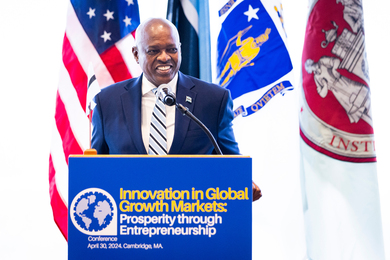
President Mokgweetsi Masisi of Botswana visits the Legatum Center at MIT
- More news on MIT News homepage →
Massachusetts Institute of Technology 77 Massachusetts Avenue, Cambridge, MA, USA
- Map (opens in new window)
- Events (opens in new window)
- People (opens in new window)
- Careers (opens in new window)
- Accessibility
- Social Media Hub
- MIT on Facebook
- MIT on YouTube
- MIT on Instagram

IMAGES
VIDEO
COMMENTS
ESL Presentation Topics: 12 Mini Presentations. ESL presentation topics for intermediate and upper intermediate students. Great as a warm-up or a speaking lesson. You can use the slideshow and share your screen on Zoom or other app when teaching online. Just click on the full screen option in the top right corner of the slideshow.
Plus, it's fun to hear what students have to say. Here are my top presentation projects for ESL/EFL students. Basic speech (not recommended!) Presentation, then discussion time. Poster presentation. Making a movie. PowerPoint presentation. Impromptu presentation. Teaching the class how to do something.
Presentations. Give students a presentation of a topic of your choosing, perhaps your own hobby and model the format and language that you want the students to use. I tend to share slides with the student with the title of each slide already inserted. Students then have to fill the space with suitable information for that slide.
ESL presentation topics are a great way to learn English, build confidence, and learn about different cultures. They can be fun and rewarding for students of all levels. Beginners can start by sharing their daily routines and interests. It is a good way to practice using basic vocabulary and grammar in a fun way.
Use short, simple sentences to express your ideas clearly. Pause from time to time and don't speak too quickly. This allows the listener to understand your ideas. Include a short pause after each idea. Speak clearly and at the right volume. Have your notes ready in case you forget anything. Practise your presentation.
Listening to music with English lyrics can be fun and engaging activity that can also start conversations. Watching music videos with subtitles will help students remember the vocabulary they hear in a song. 8. Television. Television is one of those topics that everyone has an opinion about.
Opinion = 3. PPT slides = 2. Overall impression = 4 (eye contact, voice, looking friendly, posture). We spent about a 1/2 hour in class practicing things like how loud to speak, how to stand, making eye contact, etc. If students went in groups, the entire group got the same grade. Speech set-up: Students had to memorize their speeches.
6. Do improvised presentations on random topics. Once you or your students have built up some confidence in speaking, you can start trying some real challenges, like on-the-spot presentations. Do this by writing out a list of different topics and putting them in a hat, bag or any other object you or the students have to stick your hand into.
Some of the best presentation topic ideas for students center around topics such as current events, education, general culture, health, life skills, literature, media and science. When picking presentation topics, consider these things: your hobbies, the books you read, the kind of TV shows you watch, what topics you're good at and what you ...
ESL Speech & Presentation Topics. Jacob has taught ESL in three Asian countries and has a master's degree in education. Studying ESL categories and topics before a class presentation will aid a ...
With this lesson plan, students practise giving a presentation in English by doing a lot of different speaking activities. The lesson is the third of the three-part series of lessons about delivering presentations. Unlimited Plan Show. B2 / Upper Intermediate. Standard Lesson 75 min.
speaking test. try to speak freely. 882 uses. A selection of English ESL speaking ppt slides.
These ESL speaking activities have the simple aim of encouraging students to speak openly and freely, with minimal support, in order to achieve their communicative goals. ... Discussion and Presentation Style Speaking Activities Expressing Opinions. Expressing Opinions: ... With questions covering 50 topics, our book is perfect for teachers who ...
12. Story Chain. 1. Interview Pop. Student level: Pre-Intermediate to Advanced. Type of Lesson: Group or Individual. This is a great one for students to have fun and be creative. Put students in pairs, or you could also carry this one out in a one-one lesson. Students choose one person they want to interview.
Here are some of the most popular articles for teaching children. You can find English conversation games, activities for very young learners, and ideas for teaching children how to speak English in a fun way. Hot Potato Game. ESL Kindergarten Games and Activities. TEFL Speaking Games for Kids.
Step 3: Be novel. Make sure you either select a new topic or bring an entirely new and unique perspective to an already covered issue. For instance, don't make a presentation on the "best lead generation strategies.". Your audience has probably heard those dozens of times already. Corny.
169 Five-Minute Topics for a Killer Speech or Presentation. Jim Peterson has over 20 years experience on speech writing. He wrote over 300 free speech topic ideas and how-to guides for any kind of public speaking and speech writing assignments at My Speech Class. There are pros and cons to giving a 5-minute presentation.
Before you start the school year, dedicate some time to preparing a list of free talking topics (see below). First, print the conversation topics below. Second, cut each topic and put them in a hat. Finally, have them attached to your hip whenever you're in need. You can either open the whole classroom for discussion or have them speak in ...
Data. Data visualizations can elevate your presentation from being a good one to a great one. By providing data behind your arguments, you'll appear more trustworthy and confident in your audience's eyes. Add charts, graphs, interactive maps, and more to your presentations with Prezi Design. You can choose from a wide selection of charts ...
Topic: Life. View Conversation. . 1. 2. 3. . Browse our range of ESL speaking topics for beginners. Perfect for students with an A1 or A2 level who want to improve their English conversation skills.
Gender Issues Discussion/Speech Topics. Men should open doors for women. Men and women can never really be equal. Women are better at teaching children than men are. Men are smarter than women. Companies should have quotas on their executive boards to make them 50% female. At a bar, men should initiate conversation with women (and not the other ...
Interesting Presentation Topics. Ancient Greek Heroes Modern Interpretation. Antidepressants and Their Effects on the Human Brain. How Bad Nutrition Affects a Person's Appearance. Traces of Romanticism in Well-known English Literature. Influences of Music on Mental Health. How Religion and Politics Blend Within a State.
A selection of English ESL speaking topics printables. speaking topics. Worksheets. Powerpoints. Video Lessons. Search. Filters. 226 Speaking topics English ESL worksheets pdf & doc. SORT BY. ... Speaking topics: Fam. Conversation questio. 152 uses. helenwest1. BULATS Speaking Test. Part 3 of the BULATS. 7501 uses. PhilipR. Let's Talk About Edu ...
Trump slurs words and struggles to gain crowd enthusiasm in Midwest rallies On a day off from his criminal trial, Trump decried Biden's "infrastrucker, ershure para," in a bout of confusion
Former MIT professor and interdisciplinary speech processing inventor Francis Fan Lee died at 96. Lee helped to develop a machine that read English text out loud and won an Emmy for his work on subtly speeding up film and audio without a noticeable loss of pitch.
While U.S. Debates Free Speech, Pro-Hamas Rhetoric in France Is a Crime Prosecutors are investigating far-left politicians, union officials and others for condoning terrorism after the Oct. 7 attack
Stock indexes were mixed at the close. The S&P and Nasdaq dropped about 0.3%, while the Dow ended up 0.2%, or 87 points. Stocks handed back afternoon gains.
To investigate morphologic and clinical presentations of mpox in diverse populations, researchers conducted a review of the records of 54 individuals (mean age, 42.4 years) diagnosed with mpox at ...
Higher education isn't daycare. Here are the rules we follow on free speech and public protests.